Protest 2023-12-30 by Neta Dekel
The demonstration at Habima in Tel Aviv was marked by loud cries, sadness, and pain as people protested against the government.

Protest 2023-12-30 by Neta Dekel
The demonstration at Habima in Tel Aviv was marked by loud cries, sadness, and pain as people protested against the government.









"ACT NOW"
by Alain van Hille
BRUSSELS, Dec 3 (Reuters) - Police said about 20,000 people protested in the Belgian capital on Sunday to demand more action to fight global warming as delegates from some 200 countries met in Dubai for the United Nation's COP28 climate conference.
Marching to the beat of drums, protesters waved banners saying "ACT NOW" - the "O" stylised to resemble the Earth on fire - and "There is no Planet B".
"We think it's really important to raise everyone's awareness, especially the children's, about the future of the planet and about leaders who don't always listen to what's going on," said a protester who attended with his son and gave his name as John.

















Scottish Trades Union Congress St Andrews Day Parade 2023
by Cameron Scott
St Andrews Day falls on the 30th of November and is Scotland’s official national day. Each year, on the last Saturday in November, the Scottish Trades Union Congress (STUC) holds its St Andrews Day anti-racism and anti-fascism parade through the centre of Glasgow. This year the procession, headed by a particularly energetic drum corps, started at Glasgow Green and finished with a rally at The University of Strathclyde. Over one thousand participants took part, representing trade unions, various community action groups and the Sheku Bayou Family Justice Campaign – a group dedicated to fighting for justice following the death of Sheku Bayou in police custody in May 2015. Amongst the dignitaries taking part in the parade this year were STUC General Secretary Roz Foyer and leader of the Scottish Labour Party Anas Sarwar, both of whom were in the group that headed the procession, and the rally at the end of the parade was addressed by various speakers, including Scotland’s First Minister Humza Yousaf.
I missed that rally, opting instead to head to the nearby Glasgow Gallery of Photography for some respite from the bitter cold and, more importantly, to view and take some pictures of Progressive gang member George Koulouridis’ image taking pride of place in the current Masters Of Street Photography exhibition – a much better use of my time before heading for the bus home.
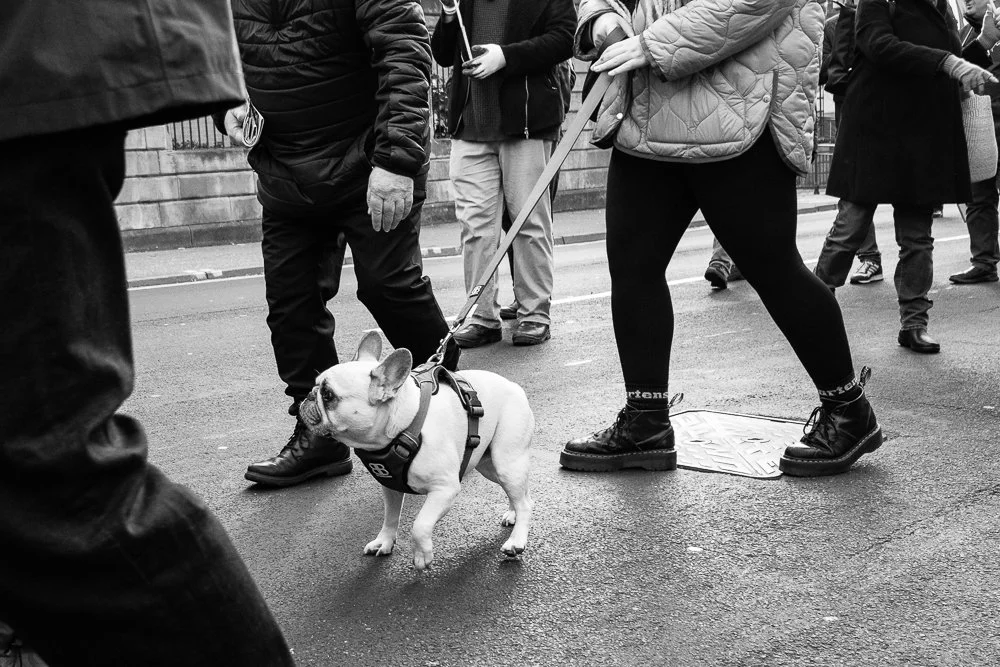




A house to live
by Delfim Correlo
On September 30, thousands took to the streets in various cities across Portugal.
On a scorching weekend, they preferred the street to the beach, demanding that effective measures should be taken due to the exponential rise in the cost of housing.
Voices from the crowd shouted slogans such as "Peace, Bread, Health, Housing", "Housing is a right, without it nothing is right", "Millions for the banks, pennies for the people", or "A house is for living in, not for speculation".
In recent years, housing prices and rents have skyrocketed to unbearable levels for young people and families.
A growing demand for housing, with a significant component of foreigners (seduced by the tourist side of our country) and with greater purchasing power, seems to be the trigger- in the opinion of many - for growing real estate speculation in a market that (as is being proved) lacks regulation.
I dare say that in the last 5/6 years, in cities like Porto and Lisbon, housing prices have almost doubled, especially in the historic downtown. At the same time, for those earning the minimum wage (€740.83), the most they can afford is to rent a room with someone... since in the main urban centres a single room in an apartment can cost up to €500. Migrant families make up this group.
In addition, the rise in interest rates has further increased the pressure on families, now facing increasing mortgage payments, who do not understand the goodness of such a measure and its potential effect on inflation which is taking too much time to be seen....
These events took place one day after the president of the republic promulgated a package of government measures (“More Houses”), which effect everyone seems to doubt.
The photos were taken in Porto.





by Cameron Scott
After a relatively quite summer, unions here in Scotland who represent various public sector roles have been taking to the streets once again to demonstrate and campaign against proposed service cuts, job losses and below inflation pay awards.
Staff at Glasgow’s museums and galleries, represented by Unison, are facing a 30% reduction in positions and have been campaigning each week since August at various locations across the city. Additionally, at the end of August the Fire Brigades Union held a rally in George Square to protest against an £11 million package of cuts that would see appliances removed from some stations and also introduce a change to water rescue services, both of which would see a combined reduction of around 200 jobs.
The city’s parking attendants, represented by the GMB and Unite unions, held a one-day strike on the day that the Scotland and England national football teams met in Glasgow to celebrate 150 years of rivalry. The pickets marked the occasion by wearing masks representing both of the respective government leaders, while the Scottish football team marked the occasion by losing again.
Last but by no means least, lecturers and staff at the city’s colleges and universities have been campaigning against a proposed trade off between jobs and salaries whereby any pay awards granted will be offset by job losses, a situation that the Unite, Unison and Educational Institute of Scotland unions cannot accept for their members. This culminated in a day of action where various picket lines marched through the city to a rally held at the usual location in Buchanan Street.
From a photography perspective this was business as usual for me, essentially picking up from where I had left off in the Spring after covering the previous period of industrial unrest for nine months. However, it was nice to catch up with some of the friends that I had made during that campaign and indeed make some new ones. I have a feeling that I’ll be seeing more of them in the weeks and months ahead.
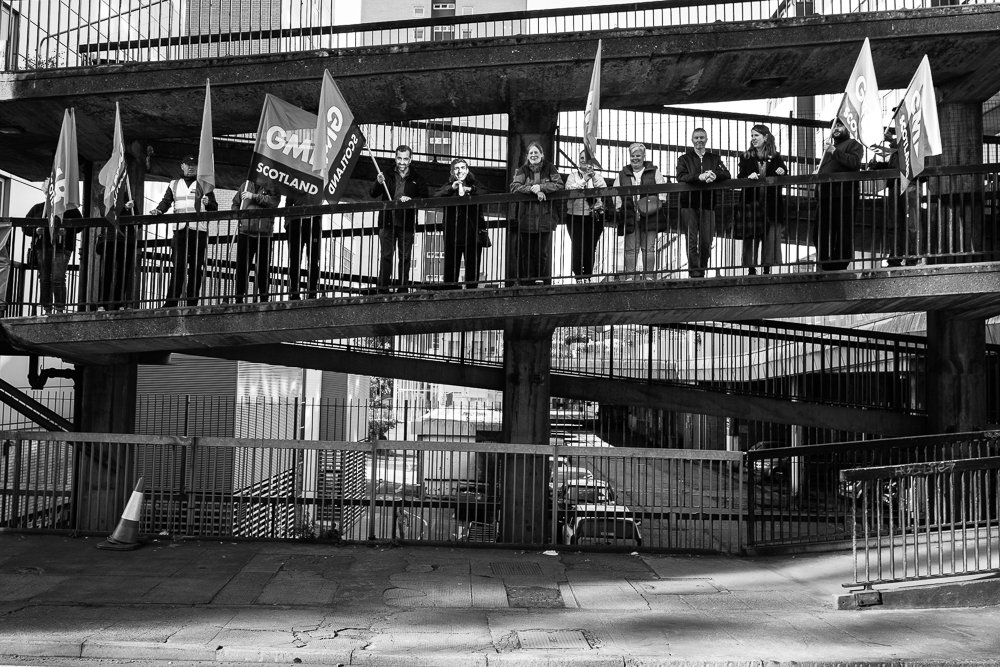



by Martin Ingber
Tens of thousands of activists, demanding an end to the use of polluting fossil fuels, marched through the streets of New York City to the United Nations on Sept. 17 to mark climate summit week.
In addition to the many New Yorkers concerned about the growing climate crisis, the demonstrators included participants from around the country and around the globe; with groups representing Native Americans and indigenous peoples from throughout the Americas in the forefront of the march.
One of the more striking features of the crowd was the great numbers of passionate young people involved. They carried signs saying ‘Our House is on Fire’, ‘Fossil Fuels are Destroying Our Future’, and ‘Fossil Fuels Kill’; along with messages demanding more progressive action from U.S. President Joe Biden. The procession, estimated at 75,000 strong, featured a colorful and creative array of thousands of hand-painted signs and homemade banners containing variations on the urgent theme of ’Save Our Planet!’
This protest, along with others in various countries around the world, was said to be the largest such event since the upheaval of the Covid-19 pandemic. It follows a year of unprecedented wildfires, increasingly catastrophic natural disasters, and the overall hottest summer on record. Global warming, the product of greenhouse gasses and emissions from fossil fuels (and long predicted by scientists), is now widely understood to be an existential threat to the future of human life on Earth. And yet, the world continues to be powered by the pollution of fossil fuels …while powerful oil and gas companies resist progress as they reap record profits.

Bread & Puppet Theater at Climate demonstration


Native American tribes banner


Attack on the Portuguese NHS
by Mario Barrela
Last Saturday I went to photograph the demonstration in defence of the SNS (national health service), which of course was joined by the teachers, etc.
In this particular case, we (the Portuguese) are increasingly feeling
The attack on something we hold dear. Along with education and culture, I think these are the most important things that a modern, civilised society should have.
Over time, we have seen the NHS deteriorate. With the ageing and relocation of doctors and nurses, we have around 1.7 million users without a family doctor, an increase of 30 per cent compared to 2022. But that's not all, we have obstetrics wards in hospitals closed with mothers-to-be having to travel many kilometres, long queues of patients waiting for operations, hours and hours of waiting in public hospitals, doctors and nurses pressured to work overtime, etc.
We pay into the social security system throughout our lives, until someone says: It's better to have health insurance so you can go to private hospitals. Then what?
Pensioners with all the illnesses that come with a lifetime of work, lacking money or health insurance, go to health centres at dawn, uncertain whether they'll be able to get appointments... So!?!?
But the demonstrations won't stop there, education is on the rise too and at the rate interest rates and inflation are rising, you'll be hearing more from me about my beloved Portugal.




by Michael C. Geiss
Magdeburg (GER) 29.07.2023, Thousands took to the streets to protest against the far-right Alternative for Germany (AfD) on Friday and Saturday as the party held a convention to choose its candidates for European parliamentary elections next year.
Protesters outside the conference venue in the city of Magdeburg waved banners with messages like "Stand together against right-wing hate" or "Nazis out".
Omas gegen Rechts was founded in November 2017 in Vienna. While Oma literally translates to “granny” in English, the word is generally used in the German-speaking world to refer to old women. Today there are more than 70 Omas gegen Rechts groups active across Austria, and more than 100 groups in Germany.
“We are the postwar generation—we know firsthand that societies can change and that there is power in speaking up,” Salzer and Scholl wrote. “We want to be a megaphone for others. By going out into the streets and opening our mouths, we challenge the cliché of the old, defenceless granny. No one reckoned on assertive old women like us.”





by Neta Dekel
The Stage, Tel Aviv. Hundreds of people gather for joint prayer, organized by Yaya Pink.
Women, men, without difference of religion, race and sex. Preference or skin color.
Beautiful, optimistic, united people.
Among the speakers - rabbi, rava, lesbian and settler.
The goal - there is a different Judaism. Our Judaism. No one has a monopoly on Judaism.
29 September 2023


21 September 2023

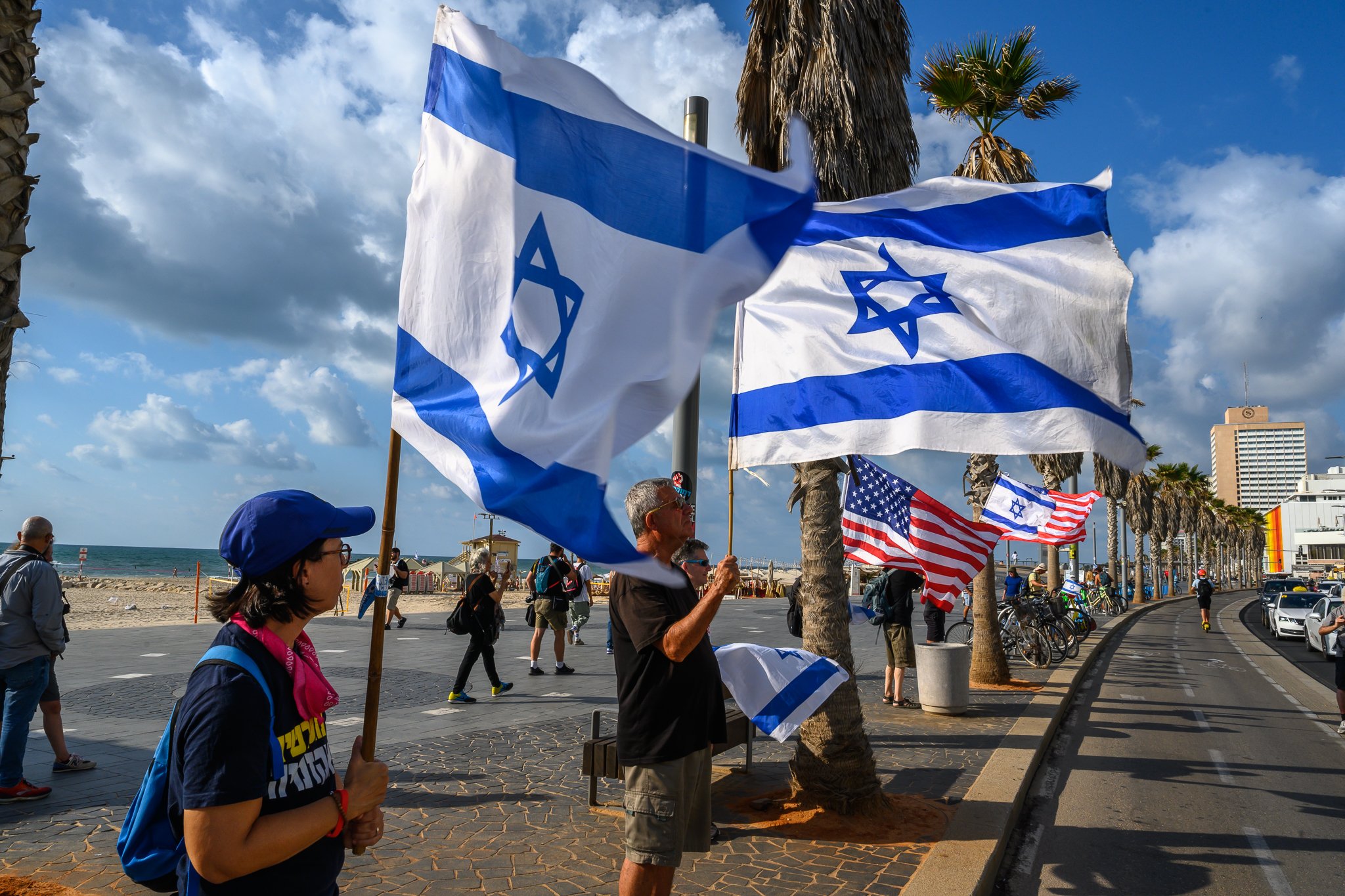
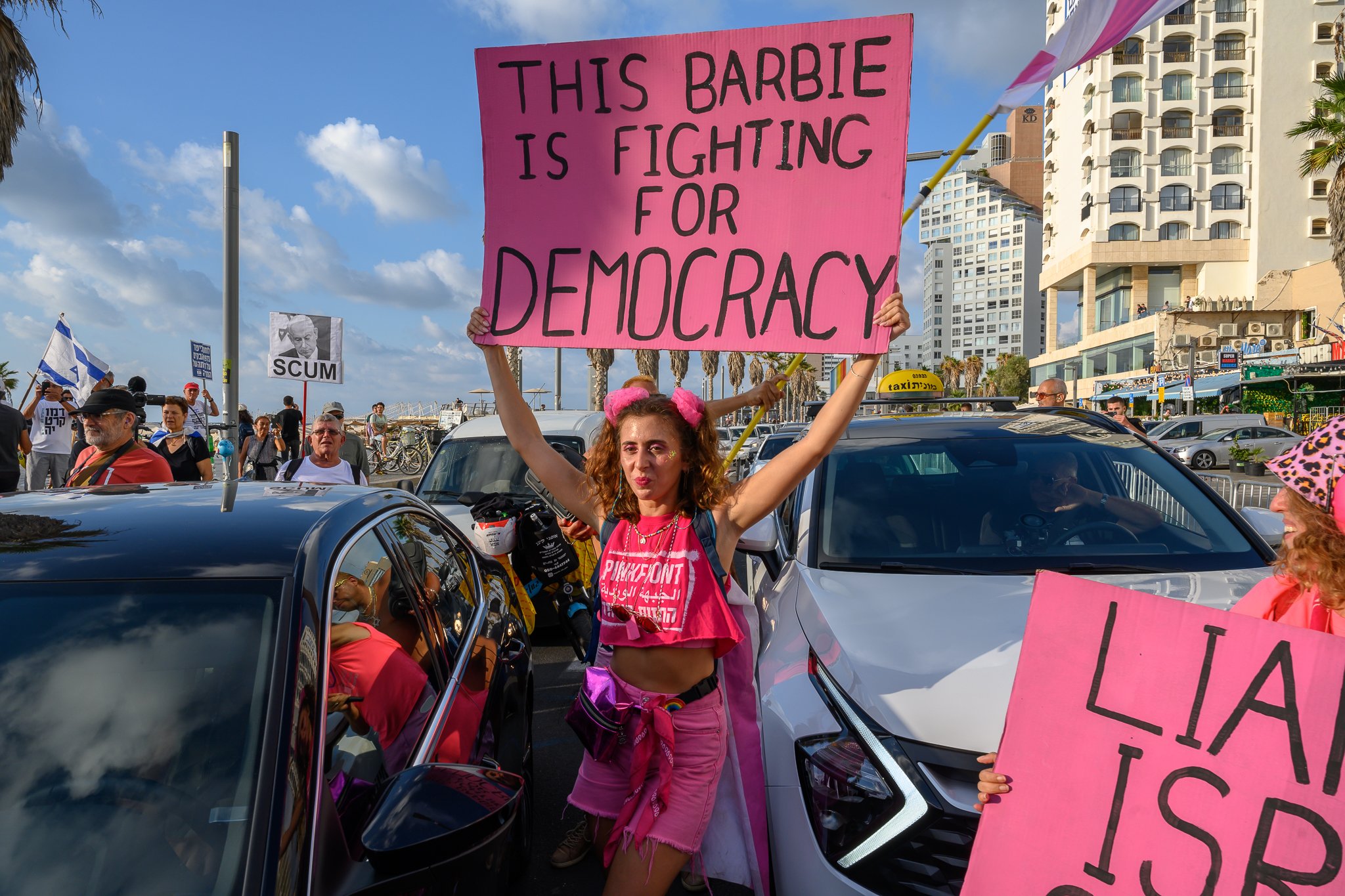






18 September
Another Day, more protests. 9 months. We will not surrender.

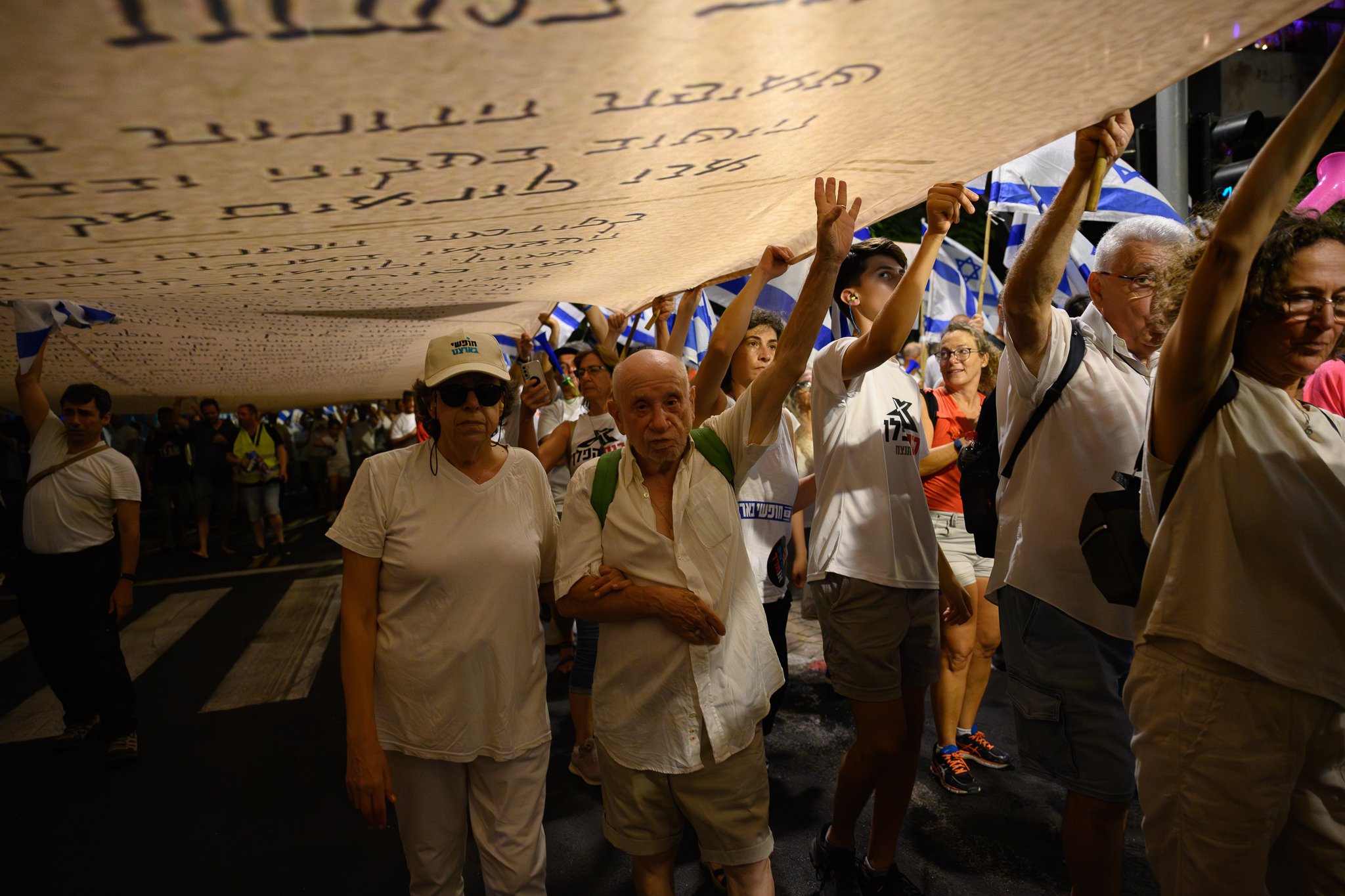
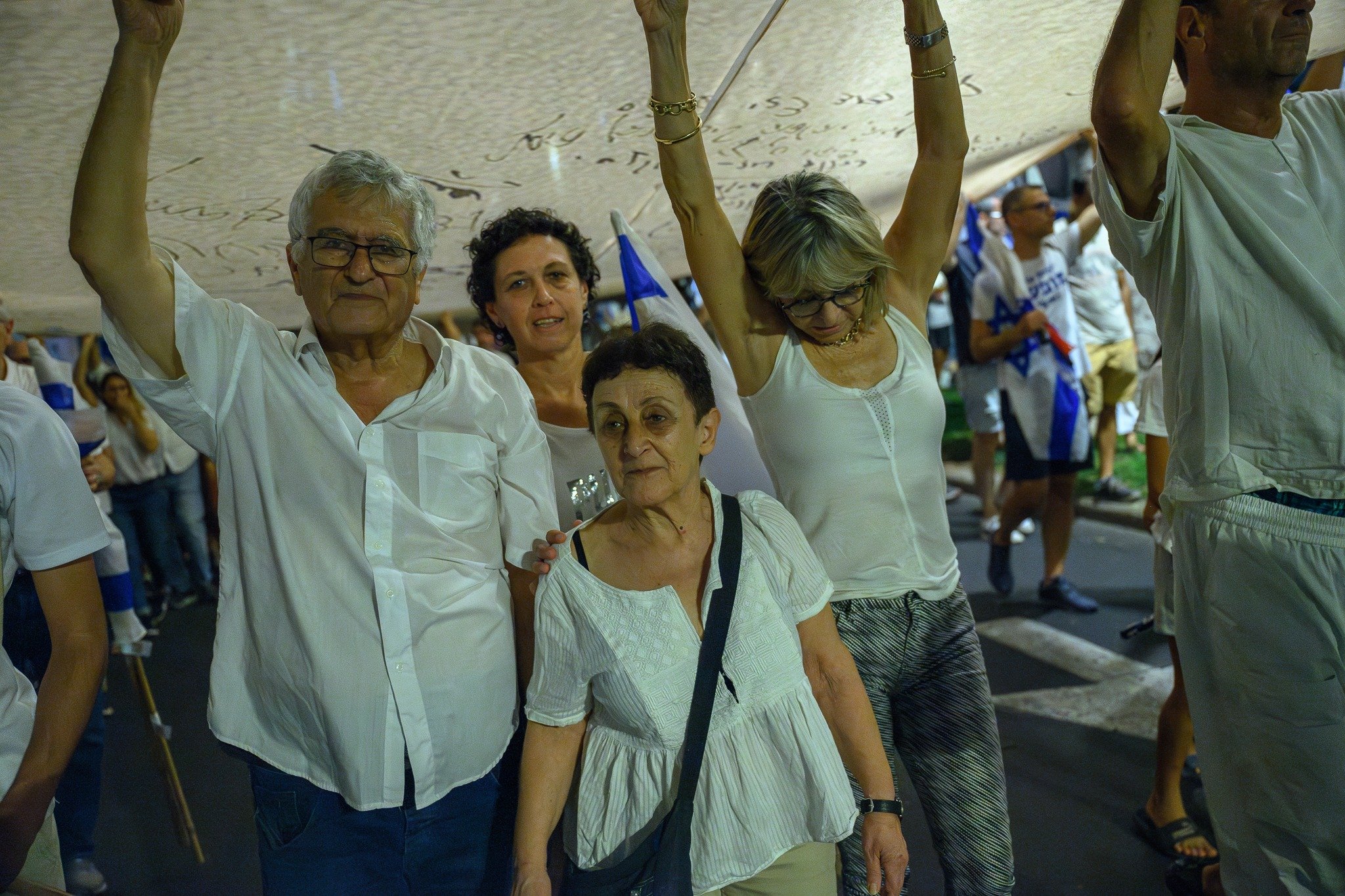


by Neta Dekel
Today is a fateful day for the state of israel The Supreme Court meets in full composition (15 judges) to discuss the cancellation of an amendment to the Basic Law (Ma'in Chapter in the Israeli Constitution) that harms the court's ability to protect citizens from governmental heartache and extremely unreasonable decisions and actions. The biggest danger we face is that the israel government will not accept the Supreme Court ruling, unless it stops in its favor, creating a constitutional crisis.
Yesterday, many citizens of israel came out to show support for the Supreme Court, making a clear statement that israel stands behind the Supreme Court and accepts all its decisions, and that the Supreme Court must make decisions bravely, independently and in accordance with the spirit of law, the Book of Independence and the principles of democracy.
12 September 2023





A weekend of protest march in the north. 40 degrees, walking on the road. Tough.
But the feeling is good, full of hope. The people started to walk... And ash to stop with the people that go - women, men, elderly and children, students and family owners. Everybody.
A weekend of protest marches in the north. 40 degrees, walking on the road. Tough. But the feeling is good, full of hope. The people started walking... and there was no stopping the people walking - women, men, old people and children, students and those with families. Everyone.




Alternative builders - Shoham


Eastern.



Yalla Tikva
Day Tuesday 17 August - Levels. Yalla Tikva



by Neta Dekel
Our democracy is under attack
32 straight weeks of protests and Battle for our democracy is alive. The leader and the people are on the streets. stronger than ever. 13 August

Shikma Bressler - the leader of the protests


Israel is facing a new and challenging era. Our democracy is under attack. The attacker is the right-winged government that was elected 8 months ago.
The Justice minister and his supporters declared a series of laws that will lead to a revolution in the supreme court, in order to take control and give the government unlimited force, without Legal supervision on unreasonable decisions.
Hundreds of thousands of people went out to demonstrate in the streets, all over Israel, in order to stop the process.
But, last week the Parliament approved the first law. The protest movement has lost the first battle.
But we will never surrender. We will continue fighting in order to keep our democracy alive and liberal !
I have joined a team of photographers that goes out to the streets in order to follow and document the protests, all the time, all over the country. The photos and videos will be used for publishing in the media by the protest leaders.
















The cry of the people rises from the streets with an intensity not heard before in Israel. Hundreds of thousands of worried and frightened people are fighting for their future and the future of their children… click on

by Corinne Spector
Israel is now fighting for its life: Will this country stay on course with the continued, common acceptance of the Proclamation of Independence it set when it was established in 1948, or will Israel now make a sharp turn away, toward religion, a possible civil war and chaos?
It seems there is a third option as well, as happened in our distant past, that is a division into two nations: Judea -- a country that is based on religious, dictatorial laws of Judaism --and Israel, a country belonging to the Jewish people that maintains equality among its citizens, whether of different religions, races or genders. It will continue to be run by democratic laws, with a separation between religion and politics, between "Church and State".
Until now, Israel has somehow been run with both democratic and religious institutions, but now the mass demonstrations have proven that we cannot continue in this manner, for a variety of reasons.
Members of the Knesset who are now in power, have determined that since they were elected by a majority, they can now dispense with the "Rule of Reason". This rule of reason, developed by the British legal system in the 16th century, stated that the courts must have the ability to critique the institutions of government. These critiques have generally protected minority rights, among all human rights.
But the Opposition, says that democracy means equality – that is, that every segment of society has an equal say in how our society will look and function.
Around the world, Judaism has many strains and stripes but the Rabbinical Courts in Israel have determined that their Orthodox way is the one that must prevail; all other types of Judaism are secondary or even irrelevant.
If so, the first victim of a religious country would be women and their rights, as is often seen in religious Islamic countries. In Israel, many women's human rights are already in the hands of the Rabbinical courts and these courts wish to expand their power into all areas of life. For instance, will women in divorce cases be seen and heard? Will women be allowed in various institutions of higher learning? Already, women have been removed from councils dealing with women's rights; it is absurd and insulting, but also frightening!
A religious country also rapidly becomes a racist one because it determines who is better or higher in the pecking order, and who is less so. And because religions of various kinds often disagree with the very existence of LGBTQ+ people, these groups will also be harmed in the near future.
Human rights in Israel have already been bashed - those who are currently in the government regularly attempt to silence those who disagree with them.
If this government really represents the majority but is uninterested in equality, what about other religions that have always existed here – will they still be able to practice their beliefs freely?
Many individuals and groups are now refusing to be a party to what they view as an undemocratic society. These include influential people from within the police force, the army, the medical field, hi-tech, and even industry – many are refusing to continue their work, and are joining others who are giving their energies to voluntary efforts fighting what they see as dire changes in Israeli governance. All of these citizens can be found protesting, for more than six straight months attendance at Saturday evening protests. Now they have
begun to demonstrate on hot Tuesday mornings as well, standing in intersections and snarling traffic all over the country.
These demonstrations are of course problematic for the smooth flow of traffic, but are also emblematic of Israel at this crossroads, and in the chaos, no one knows where we are headed.
July 2023


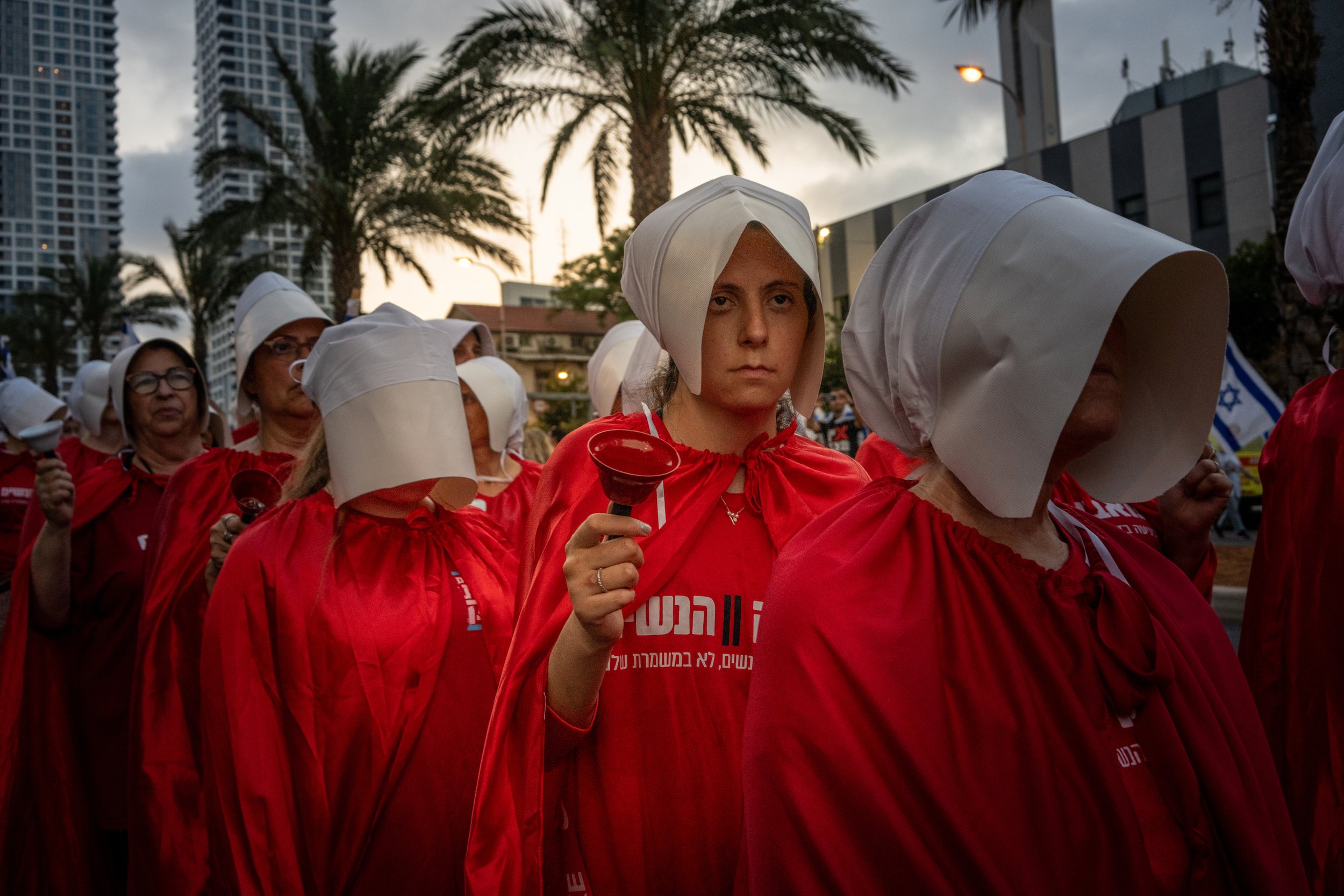
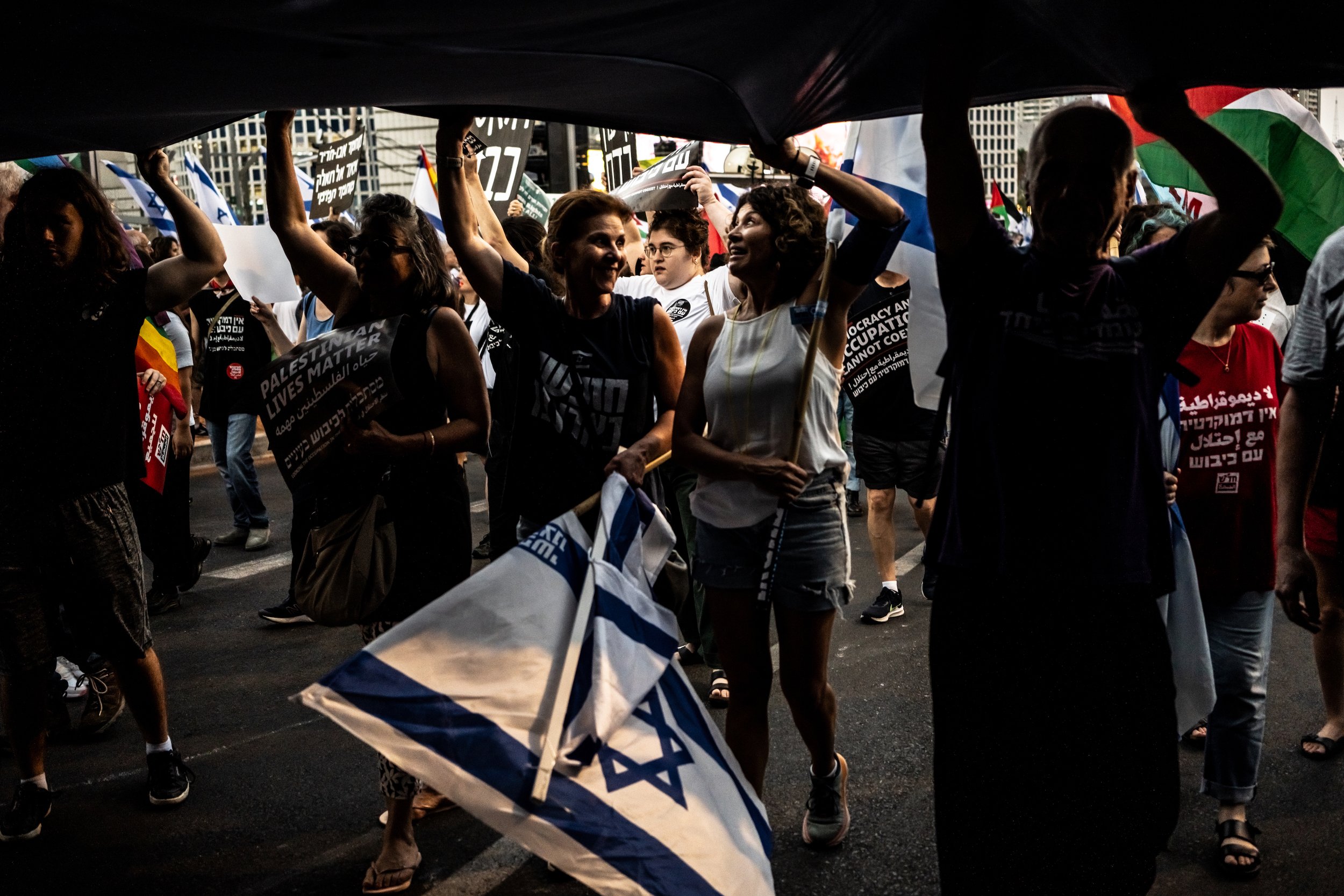



by Baruch Gian
In the last six months, Israel is under attack by the government to change the liberal and democratic rules. More than half of the population in Israel is afraid that Israel will be more similar to Hungary, Poland and Turkey, where there is authoritarianism.
Here are some pictures from the protest against the government from Jerusalem, near the government buildings, and from Tel Aviv where every Saturday night has a huge demonstration.






by Michael Geiss
The commemoration of 13 February 1945 remembers the air raids on Dresden in February 1945 that killed up to 25,000 people.
In 2011, a commemoration ceremony was also held in Dresden, which was then abused by neo-Nazis, who had travelled from all over Germany, for their propaganda on Saturday 19 February 2011.
Only a strong police presence was able to prevent the neo-Nazis and Antifa from meeting… and in 2023? Same procedure as every year!

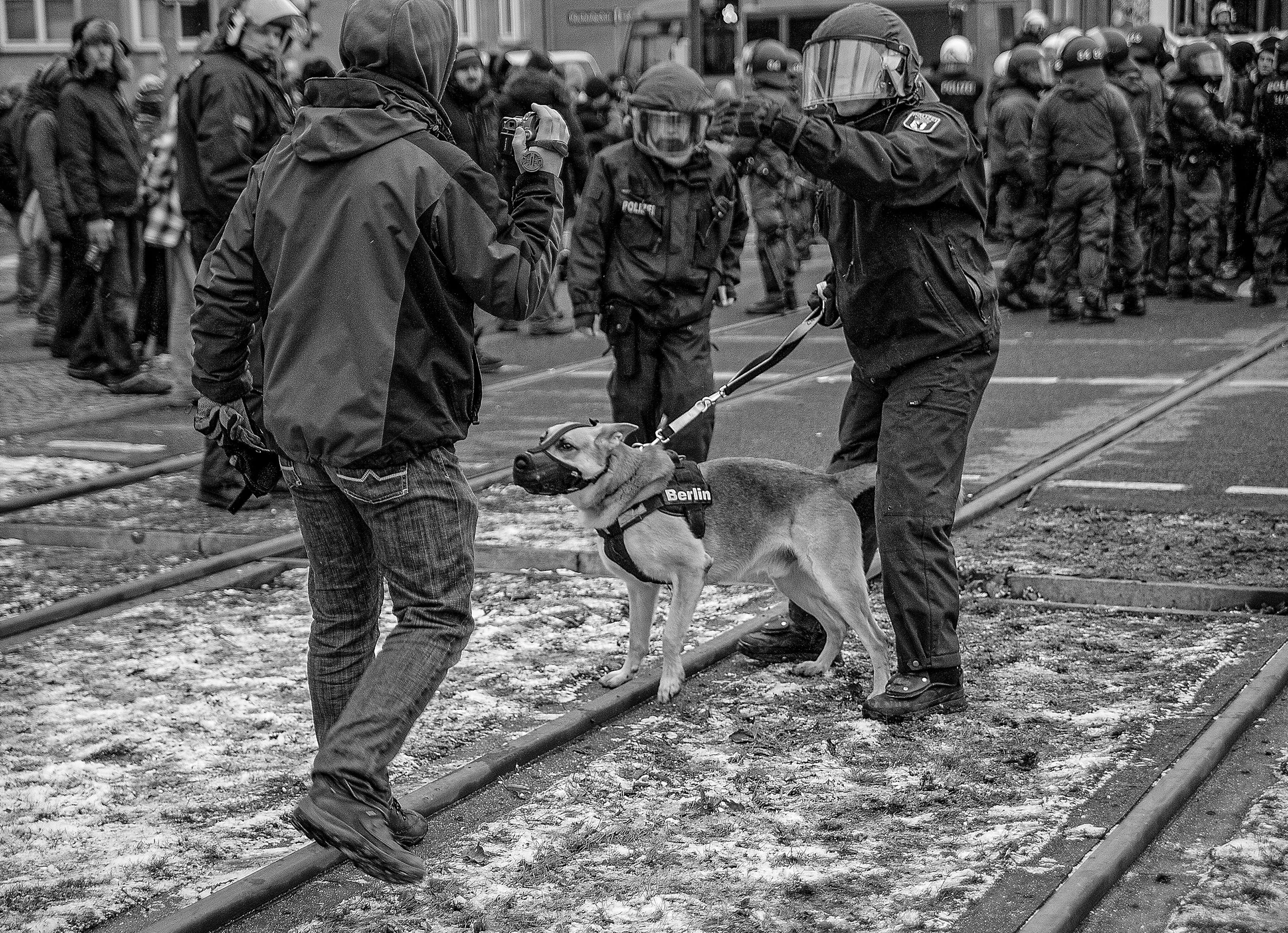



Michael Kennedy
Streets of Seoul: A peaceful noon demonstration at Seoul Plaza against President Yoon Suk-Yeol. The 62-year-old South Korean President has been in office exactly one year, and many people are impatient with his style of leadership.
Our project strives to show the different forms of political and social protests in various countries. Through photojournalism, we hope to gain a better understanding of the political dynamics in different nations.
This feature by Michael Kennedy offers an intriguing view of Korea, where geography is destiny. Seoul is halfway between Beijing and Tokyo. In fact, Korea is a peninsula of China, a country with 1.4 billion people – and, as Ukraine is a flashpoint in Eastern Europe, Taiwan will soon be the object of similar focus in this part of the Pacific.
We are used to seeing beautiful images by him but now with this analysis, we can understand them better. Arm yourself with patience and wait until you have a moment to read everything.
“What’s required to maintain momentum towards a humane civilization is we first have to transcend our prehistory.” - Christopher Hitchens (1949-2011)

Seoul April 2018
As an expat in this culture, it’s impossible to understand Korea as authentically as the native born. Yet I think it is impossible to even attempt an understanding of Seoul, South Korea and the entire peninsula without an awareness of the momentous changes and horrors and tragedies that visited this place in the first-half of the last century. M.K.
The relatively new experiment with democracy in Korea is like building an airplane in flight.
This debate about how to go forward after over five-centuries of the Joseon Dynasty is often displayed with peaceful demonstrations and rallies on Saturday afternoons along Seoul’s version of the King’s Highway.
To Korean’s, it is Sejong-daero – and this boulevard, so steeped in history, is the heart of the country.
If during the first-half of the last century your country endured the demise of a royal dynasty from 1392 at the hands of a hostile neighbor, the subsequent 35-year military occupation by that country, a ghastly three-year civil war that virtually destroyed Seoul and has never officially ended, leaving the country divided 70-years later, you might better understand why representative democracy with a side-order of dissent is passionately embraced on the streets of Seoul.
Traditions based on centuries require little explanation. They are almost encoded in the DNA of a society. Yet to pursue a new tradition, especially a new political system – a new Squid Game for barely more than three generations is far easier said than done.
Ask Americans these days about the health of the 236-year-old experiment with representative democracy, and a great many people are braced for The Last Rites, especially if a certified sexual predator is the Presidential nominee for the Fascist Republican Party in 2024.
The Republic of Korea, more commonly known as Korea – which is how the country will be referenced in this dispatch, is where the Phoenix has risen to make this Asia-Pacific country an inspiring showcase of what the human spirit can achieve.
“Geography is destiny.”
This maxim suggests Herodotus, the ancient Greek historian and geographer. Other candidates include Confucius, Alexander the Great, Julius Caesar, Genghis Khan, Napoleon, Bismarck, and George Patton.
Yet credit goes to Ibn Khaldun (1332-1406), the Arab sociologist, philosopher, and historian widely acknowledged to be one of the greatest social scientists of the Middle Ages.
Korea is a peninsula of China. And the distance between the southeastern Korean port city of Busan and Fukuoka, near Hiroshima, is 218 kilometers or about 136 miles.
Based on air travel time:
Seoul to Beijing is 2.15 hours;
Seoul to Shanghai is 2.05 hours;
Seoul to Tokyo is 2.20 hours;
Seoul to Vladivostok is 2.40 hours.
Ibn Khaldun was right, and geography is destiny. For Korea this means a never-ending connection with both China and Japan.
Part I
Recently, Koreans took to the streets of Seoul because the Japanese government announced that it would discharge contaminated water from the crippled Fukushima nuclear plant into the Pacific Ocean.
On March 11, 2011 a combination level-seven earthquake and tsunami crippled the Fukushima nuclear power plant, located 130-miles northeast of Tokyo. To date, the earthquake is considered the most powerful in Japanese history – and a level seven earthquake is what destroyed the nuclear facilities in Chernobyl in 1986.
Protesters in Seoul were wary of Japan’s ability to safely discharge the water, and voiced concerns about the immediate impact on the Korean peninsula – warning that the discharged water from the Fukushima disaster would ultimately impact both sides of the Pacific Rim, from Siberia-to the Philippines on one side, and from Alaska-to-Panama on the other side.
During the Saturday demonstrations Japan agreed to allow a 21-member inspection team of experts from Korea to visit the Fukushima site on Sunday.
Yet to understand the edginess of the Koreans about their Japanese neighbors, one must have at least a nominal understanding of what happened on this peninsula at the beginning of the last century.
Part II
As the Americans expanded the concept of Manifest Destiny in the late-1890s to justify island hopping across the Pacific Ocean to China by taking over the sovereign country of Hawaii, the Japanese did the same with the independent Kingdom of Okinawa.
By 1904, the Japanese had crushed both the Pacific and Atlantic fleets of the Russian Imperial Navy – which in turn triggered the First Russian Revolution a year later and reduced Czar Nicholas II to a constitutional monarch.
U.S. President Theodore Roosevelt brokered the Treaty of Portsmouth in 1905, which ended the Russo-Japanese War. As a result, he was awarded the Nobel Peace Prize in 1906, even though he fomented a revolution in Colombia three years earlier that created the breakaway country of Panama - so Americans could build a canal across the Central American isthmus at a cheaper cost.
The Treaty of Portsmouth in 1905 allowed Japan to go off the chain in the Far East, and exert control over both Korea and southern Manchuria. Roosevelt and the Americans turned a blind eye to this and concentrated on both the Panama Canal and dominating the Philippines, as a further stepping stone to China.
Roosevelt knew he had unleashed The Dogs From Hell by doing nothing to restrain Japanese aggression in the Far East, yet he had no way of knowing The Day of Reckoning for America would finally occur on December 7, 1941 at Pearl Harbor and Japanese Imperial intentions for an Asian Empire would end in the horrifying ruins of Nagasaki on August 9, 1945 when the U.S. wasted the second city in three days with an atomic bomb known as Fat Man at 11:02 a.m. local time.
Keep in mind that the Guns of August, the beginning of World War I in 1914, started with a cavalry charge, and 31-years later, World War II ended with Japanese citizens – women and children, and older civilians, being vaporized by an atomic bomb in Nagasaki. And this mind-numbing chronology all happened in the first half of the 20th century
Korean history has no record of aggression toward China or Japan – or any other country. Yet in 1895 – in the opening salvo of things to come, Japanese agents assassinated Joseon Empress Myeongseong - known informally as Empress Min (1851-1895).
Empress Myeongseong’s husband, Emperor Kojong, died suddenly in Deoksu Palace on January 21, 1919, where he was confined by the Japanese – which is to say under house arrest. He was 66-years-old, and because he had no critical health issues, it is assumed the Japanese poisoned him.
With the official annexation of Korea by Japan in 1910:
- the Korean language was banned in schools and universities;
- loyalty to the Japanese emperor was mandatory;
- the Japanese language replaced Korean in public places;
- all films in Korea were in Japanese;
- Japanese authorities burned over 200,000 Korean historical documents, essentially wiping out the historical memory of Korea;
- during the Japanese Occupation, land and wealth were confiscated for the Japanese;
- agricultural products and natural resources were sent to Japan;
- nearly 725,000 Korean men were forced to work as slaves in Japan and its other colonies;
- and as World War II loomed, Japan forced hundreds of thousands of young Korean women to become “comfort women,” – sex slaves who served in the military whorehouses for the Japanese army.
In view of the recent dreadful history between Korea and Japan – especially the horror of the “comfort women,” some of who are still alive, yet stigmatized forever as outcasts despite circumstances well beyond their control, it’s easier to understand why Korean protesters gathered Saturday on Sejong-daero because of enormous bitterness and distrust regarding Japan.
For Koreans, Sejong-daero, the 10-block boulevard that stretches through the center of downtown Seoul, literally represents the heart of the country, its very essence and significance to anyone with an ounce of Korean heritage.
The boulevard, named for Sejong (1397-1450), the Joseon monarch best known for his development of Hangul, the phonetic system for writing the Korean language that is still in use, starts from Gyeongbokgung – the largest of the Five Grand Palaces from the Joseon dynasty, and ends at Namdaemun Market, the oldest market in Korea.
Gyeongbokgung is where Japanese agents assassinated Empress Myeongseong in 1895. Sejong-daero passes along Gwanghwamun Square, with Deoksu Palace at midpoint.
This is where Kojong died in 1919 – under Japanese confinement, the last of the Joseon monarchs.
Seojong-daero represents everything important to Koreans: what it was, what it is, and what it will be.
I walk this path nearly every Saturday in good weather. The street is my university.

Part III
For Koreans, the Baby Boom Generation refers to the large group of people who were born between 1955 when the fertility rate rose sharply after the Korean War (1950-1953) and 1963, when the birth rate slowed due to birth control policies, accounting for over seven-million people - or around 15% of the population. This group is believed to hold a considerable portion of the nation's wealth and consume expensive goods.
Korea is a conservative, patriarchal society with a low divorce-rate. In many ways, life as an American expat is reminiscent of the U.S. in the mid-to-late 1950s – really just before the assassination of John F. Kennedy, which really marks the beginning of the1960s – and ended with Nixon’s fall from grace and self-exile to Southern California in 1974.
As an example of conservative social policy in Korea, public school teachers are expected to retire at age 62 – to make way for the younger generation into the workforce. This applies to other professions, as well.
There are 188 accredited colleges and universities in Seoul. They are all competitive, with Seoul National University the top university in the country. Yonsei University in Sinchon, a trendy Seoul neighborhood, is best known for the large number of international students – including Maddox Jolie Pitt, who is majoring in Biochemistry.
His parents are familiar to most people on this planet.
So there are a growing number of both well-educated senior citizens and younger generations ready to play their parts in a vibrant Korean society.
Part IV
The cycle of life is for the old to make way for the new, and older Korean professionals with national pensions and other investments who are retired have genuine concerns about politics and social conditions in a country still divided by an unsettled war with North Korea, a historical sense of unease about Japan and the threat of China as a rising superpower.
There are a host of other socio-political issues that affect Koreans – and not just the retired set.
Yet this group of Gray Panthers is at the vanguard of the peaceful demonstrations and rallies along Sejong-daero. They do not want to lose what they have worked so hard to achieve – which is common everywhere.
Yet in a competitive fast-paced city like Seoul, some of the socio-political issues affecting Koreans are: Aging population;
Declining birth rate;
High level of household debt;
High level of youth unemployment;
The influence of chaebols in politics and business;
Geo-political tensions with North Korea and Japan.
Competition from China (steel, shipbuilding, electronics, automotive, domestic appliances);
Teenage suicide rates;
Discrimination against women relative to equal pay in the workforce;
Discrimination against the LBGT community.
The word chaebol is not familiar to most people beyond the Asia-Pacific region.
In the West, Napoleon is given credit for eliminating the thousand-year-old feudal system in Europe. Maybe this is true. Maybe the feudal system simply adapted to the Industrial Revolution, and instead of the serfs reporting to the fields surrounding the castle, they moved to the cities and reported to the factories and still existed on the edge of hope, riding the train to nowhere every day, promised the deferred gratification of heaven with a celestial deity and his son, born of a married Jewish woman.
In Korea, a chaebol is a large industrial conglomerate run and controlled by an individual or family. Several dozen large Korean family-controlled corporate groups fall under this definition.
While the founding families do not necessarily own majority stakes in the companies, the descendents of the founders often retain control by virtue of long association with the businesses.
Among the largest chaebols are Samsung, LG, Hyundai, and the Lotte Group.
In America, those morbidly rich white families who enjoy generations of inherited wealth and corporate welfare in tax write-offs, less taxes or no taxes, have deep connections with each other that involve a road that goes through Choate Rosemary Hall, a private secondary school and usually leads to Harvard or Yale.
Debutante Balls in America are passé – yet it used to be an occasion for morbidly rich white men to offer up their well-bred daughters to promising well-bred sons of other morbidly rich white men.
To regard this longtime annual ritual as sophisticated slave auctions is too crass and too cynical. These were business arrangements that were good for the two families, the basis for virtually all marriages for thousands of years, before the fleeting notion of Romantic Love screwed with that time-honored business model.
Arranged marriages among upper-class Arabs is still the norm, and this is sometimes the case in India.
In 1954, Joseph Kennedy (1888-1969) offered Jacqueline Bouvier (1929-1994) $1m to marry his son, John (1917-1963). She took the money. This is a fact.
“A rose by any other name is still a rose.”
From New York City’s Times Square-to-La Vida Loca en Juarez-to Bangkok’s Nana Plaza, there is a name for a woman who takes money for sex, and it’s not Rose.
In Korea, the chaebols wield enormous influence over business and political affairs, and the families have deep connections with each other by attending the same private schools and universities, and marrying within the same class system.
This is to say the chaebols in Korea invest heavily in the politicians of the National Assembly to advance their agendas.
“A rose by any other name is still a rose,” and this version of corrupt Squid Game politicians is called Congress in America, the House of Parliament in the United Kingdom, the Knesset in Tel Aviv and the Diet in Tokyo. Same as it ever was.
As American street philosopher George Carlin (1937-2008) said: “Forget the politicians. They are put there to give you the idea that you have freedom of choice. You don’t. You have no choice. You have owners. They own you. They own everything.”
Part V
Since 2018, I have covered political demonstrations and rallies in Seoul as a freelance photojournalist. I’m a retired American living in Seoul with my Korean wife. I’m not interested in generating money from my photography. There are any number of reasons why I use a camera to document life, and every reason becomes the same: it’s the way I’m wired.
I can more or less acquit myself on any charge of having a serious knowledge about Korean culture and politics. I’m still a work-in-progress, and have no authority on any subject – including the ones that resulted in two different American college degrees.
As Peter O’Toole (1932-2013) once said with wonderful Irish eloquence: “I’m here because I’m not there.”
I live in Seoul, and have called the city home for over a dozen years. Yet I still cannot master enough of the language to express myself in a simple sentence. I could admit to some diminished intellectual capacity, though to say I experience bouts of mental ennui is more to the point. Thankfully, my fate was to be born an American at a time when English is accepted as the unofficial international language.
It is important to note that in the Orient, which is commonly referenced as China, Japan and Korea, a person’s family name precedes a given name.
Until recently, former President Moon Jae-in was a lightning rod for weekly demonstrations in Seoul. He served as the 12th president of Korea from 2017-2022. In Korea, the president is directly elected to a five-year term, with no possibility of re-election. If a presidential vacancy should occur, a successor must be elected.
Moon inspired countless protests in Seoul because of his advocacy of reconciliation with Kim Jong-un and the subsequent reunification of the Korean peninsula. It didn’t help that Moon Jae-in’s family is from what is regarded as North Korea. The Koreans south of the DMZ – the 38th parallel, regard the north as a Communist country, which is hardly the case. Kim Jong-un operates a totalitarian gangster state that routinely performs cyber bank robberies to finance his regime.
Kim Jong-un had his older half-brother killed by VX nerve agent at the Kuala Lumpur International Airport on February 13, 2017. These things happen among freedom-loving dictators in Asia.
Putin’s adversaries, critics and enemies – a clumsy lot, keep falling out of windows from the upper floors of apartments and hotels around Europe, like a scene from Atomic Blonde (also 2017).
“Clean up on Desolation Row.”
Yet any man who hangs out with a certified freak like Dennis Rodman and a certified sexual predator like Donald Trump is truly a Black Belt Loser.

Part VI
What never endeared President Moon to many of the older, conservative Koreans and fueled their contempt for him is that he seemed to take office at the expense of a political scandal that resulted in the impeachment, conviction and imprisonment of President Park Geun-hye, his immediate predecessor.
For the unfamiliar, the 71-year-old Park Geun-hye is a woman, the first female President in Korean history. Park broke the glass ceiling of the chaebols, and was always going to have to pay a price.
Sometimes our story is foretold. Sophocles examined this theme through Oedipus Rex. The Arabs were no doubt influenced by Hellenistic values when Alexander’s generals stayed behind in Egypt to rule. Arab fatalism is expressed as: “It is written.”
David Lean’s Lawrence of Arabia (1962) features Gasim murdering a member of Auda Abu Tayi’s tribe (played by Anthony Quinn), and T.E. Lawrence (Peter O’Toole) is forced to kill him with his own hands to prevent a blood feud on the eve of a successful operation. Auda Abu Tayi’s comment says it all: “It is written.”
Yet in the case of Park Geun-hye, there is more to a story perhaps foretold.
Her father, Park Chung Hee (1917-1979), is considered the single most influential figure in South Korean politics during the 20th century. He ruled the Republic of Korea from 1961-1979, leading the country through a period of rapid economic development and transforming South Korean society.
Park was a high-ranking general and his resume includes a military coup in 1961, when he ruled briefly as an authoritarian dictator, before becoming elected as President in 1963.
There is much more to this story, which fits the mould of a classic Shakespearian tragedy.
On October 29, 1979, in a meeting with Korean Central Intelligence Agency (KCIA) Director Kim Chaegyu, an argument broke out between Kim and Park with the President criticizing the KCIA for not doing enough to end political demonstrations critical of him. Frustrated with the criticism, Kim pulled out a pistol and shot Park dead on the spot. The KCIA Director also killed the President’s bodyguard.
Five years before Park’s assassination by his KCIA Director, the President’s wife, Yuk Young-soo, was shot dead by Mun Se-gwang, a Korean born in Japan who was a North Korean sympathizer. He arrived in Seoul on a Japanese passport to assassinate President Park, but missed and killed his wife instead.
It is against this background that Park Geun-hye came of age, gained leadership experience and was elected as the first woman President of Korea in 2013.

Part VII
Most people have experienced a turning point, a serious peripeteia when they realize ideals are not going to be borne out in reality.
Yet despite this harsh truth, people “beat on, boats against the current,” like Nick Carraway muses foolishly about the elusive butterfly – our unattainable dreams at the end The Great Gatsby (1925).
In 2013, Koreans were optimistic about the return of a Park political family member as President. This was not exactly the Kennedy Camelot illusion, but close enough.
However, within four-years, Park had completely squandered her political star on corruption, kick-backs, a horribly mishandled national tragedy (the 299 deaths in the Jeju ferry sinking), and she was impeached and tossed out of office.
The sins of the father.
Park’s troubles had only just begun.
Moon Jae-in was elected President following Park’s downfall, and he ordered an investigation into her alleged corruption. Moon appointed Yoon Suk Yeol as special prosecutor. Yoon had served in Park’s administration, yet was demoted for pursuing corruption among the KCIA for helping her win the election in 2013.
Ultimately, Park was sentenced to 25-years in prison.
Politically, Park was a conservative and took a tough stance against North Korea. Moon upended that approach in favor of reconciliation with Kim Jong-un, the third generation of the Kim family to rule the northern part of the divided peninsula since 1953, which is essentially one large prison camp.
Kim Jong-un likes to posture and threaten to destroy Seoul, yet the city – and the rest of the southern peninsula is a cash cow for him. Every time Kim Jong-un threatens destruction in the south, property taxes in Seoul increase and the north simmers down for a while. There’s no reason to solve for X, the government in the south sends some shut-the-fuck-up money north to the Kim dynasty, a very pale and sixth-rate imitation of the Joseon dynasty.
By 2018, the combined circumstances of Park’s lengthy imprisonment and Moon’s overtures toward Kim Jong-un are when more and more demonstrations started to occur in Seoul on Saturday afternoons. The group was primarily older, retired Koreans who favored Park Geun-hye for her firm stance against Kim Jong-un.
While many Koreans can speak English, the ability to read English is not always on the same par. Yet the demonstrators – both men and women, carried placards in English that called for Moon’s resignation, called for his imprisonment, even called for his execution.
Other signs – in English, called for the Americans to kill Kim Jong-un.
In Korea, public demonstrations can only occur with advance planning, and this means a parade permit. Once approved by the city government, a large contingent of police is assigned to the event to maintain security.
Unlike the United States, guns are outlawed in Korea. There are no gun shops, no gun sales on the parking lots of a strip mall, no mass shootings, and school classrooms are not used as shooting ranges by deranged males with AR-15 style rifles.
Korean police carry batons, yet I have never seen any used anywhere at any time.
Korea maintains a strict policy of mandatory military service, which requires all able-bodied men between the ages of 18-and-28 to serve in the armed forces for about 18-to-21-months. This obligation includes K-Pop idols like BTS, despite how much money the group generates for the national treasury.
If the military ranks have met their quota, Korean men fulfilling their military obligations often serve with the local police units in an auxiliary capacity. While unconfirmed, it’s frequently assumed that for a generous contribution to an influential political fund, the families of young men can arrange for assignments with police units rather than the military.
No surprise: A Korea Times article noted that young chaebol men have a disproportionate number of exemptions compared to the general public. About 35.1 percent of chaebol family members from the top 11 conglomerates do not serve in the military.
This was common among American patricians during the Vietnam War era. The phrase that best explains this entitlement: “Money talks, and bullshit walks.”
Part VIII
The cast of characters
Park Geun-hye was sentenced to 25-years in prison for corruption. She refused to attend her trial or her sentencing, claiming she was being framed and unjustly accused.
Moon Jae-in continued a policy of reconciliation with North Korea, and higher taxes that squeezed the middle-class. Moon’s detractors continued to denounce him as a Communist stooge, a traitor and all-round loser.
Anti-Moon demonstrations continued until the COVID Pandemic put the brakes on crowd gatherings in Korea.
Even though Moon could not run for a second term, he ultimately sprung Park from prison after five-years with a full pardon. Moon was just using Park, hoping this would “chill out” the Gray Panthers who took to the streets so often to express their contempt for him. Moon also hoped this would cement his party’s hold on the presidency.
After three months in a hospital gobbling colorful meds, Park returned home, labeled as “the disgraced former president.”
Moon’s attempt at altruism, benevolence and charity of heart fooled no one. His party lost the National Election, and there is still an outburst of “Two-Minutes of Hate,” at small rallies across from Gwanghwamun Square on Saturday afternoons. This is no different than when the Party directed a similar campaign against the non-existent Goldstein in 1984.
The small rallies across from Gwanghwamun Square on Saturday afternoons alternate between a well-dressed older man on stage exhorting the mostly geriatric folks to “accept Jesus into your heart,” reminding those still alive in their seats that the Jewish zombie died for their sins.
This message of someone dying for our sins 1,992-years-ago is delivered in both Korean and English, and remains bewildering and contradictory regardless of language. And then it’s back to two-minutes of hate for Moon Jae-in, everyone’s favorite whipping boy.
Yoon Suk Yeul, the prosecutor demoted by Park Geun-hye for investigating her cronies that helped her become President, went on to become Moon Jae-in’s handpicked special prosecutor who advocated a harsh 25-year prison sentence for “the disgraced former president.”
Moon out, Yoon in.
Last May, Yoon Suk Yeul was sworn in as the 13th President of Korea. Six months is the usual “honeymoon” period for a President elected directly by the people in a democracy.
There was the heartbreaking Itaewon crowd crush late last October that shocked the world. But so far, President Yoon has not become the object of dissent, disgust and pure white hate, like Moon Jae-in.
Kim Jong-un is still in control of North Korea, and still acting out like a petulant madman. A few months ago he dispatched a drone that was spotted flying near the Blue House – the name for the Korean Presidential residence.
People who pay attention to politics in the Orient know that the centennial of the People’s Liberation Army (PLA) is 2025.
With Putin’s effort to re-establish Imperial Russia in Ukraine – and later the Baltic States, people here are bracing for Xi Jinping to finally put his boot on the throat of Taiwan in 18-months with precise cyber attacks on that country’s banks, media and transportation networks, reinforced by a naval blockade.
There is the 80-year cycle view of American history, and it goes like this:
1. 1781 – 1861;
2. 1865 – 1945;
3. 1945 – 2025.
The American Century – starting with the end of World War II in 1945, will be hard pressed to last until 2045.
Richard Nixon and that monstrous war criminal Henry Kissinger may have opened the door with Mao Tse Tung and Chou En-lai in 1971 – but it was Ronald Reagan, that third-rate Hollywood actor, right-wing stooge and one of Miss Cleo’s favorite clients, who kicked in the door and helped fuel Chinese’s rise as a superpower.
The Reagan Revolution of the 1980s, which destroyed the unions, decimated the car and steel industries, gutted the middle-class and helped create an exclusive billionaire-class of 400-elite families that enjoy corporate welfare with an average federal individual tax rate of just 8.2 percent.
Our Day of Reckoning with Japan has come and gone: nearly 80-years in the rearview mirror. Yet Our Day of Reckoning with China may be our Appointment in Samarra.
We are 18-months from China’s centennial of the PLA, as Mao’s Revolution started to get serious. We are 18-months from potentially conforming to another major turning point in American history.
Geography is destiny, and Seoul is half-way between Beijing and Tokyo. And the largest build-up of U.S. military forces in the Pacific are stationed at Camp Humphreys in Pyeongtaek, about 44-miles or 70-kilometers south of Seoul – out of range of North Korean artillery.
It stands to reason that spies from America, China, North Korea, Japan and Russia pass each other on the streets of Seoul.
Where is George Smiley when you need him?
And yet demonstrations continue on most Saturday afternoons in downtown Seoul, with approved parade permits, because freedom of speech matters.

May – Anti-Japanese rally about nuclear contaminated water
Fini
I will be 72-years-old in a few months, and I still don’t know what I want to be when I grow up. I’m not sure if I’ve learned any valuable lessons in life – except one:
“Do what makes sense to express a passion for life, and the money will follow.”
What makes sense for me is to express my passion for life through writing, photography and travel.

by Debguru Chatterjee
People of Bengal are becoming more concerned centring the extreme corruption and mayhem in the state education system. Besides inaptly administering the school education system, the government here is accused of taking bribes to appoint teachers bypassing the merit list of teacher selection exams. For two years, teachers who passed eligibility tests and enlisted in the official panel but did not get posted, are demonstrating in the streets of Kolkata (the capital of Bengal province). Failed examinees who bribed ministers and officers for getting appointments as school teachers are losing their jobs by the ruling of the high court. Ongoing CBI enquiry regarding this scam has not much yield except a few arrests and freezing accounts in doubt. So, civilians taking charge. They are gathering under the umbrella of leftist activist organizations and trying to pressurise the government to be righteous. Rallies and protest marches are being organized all over Bengal.


On 5th May this year, I was in Barasat (a district of Bengal). As I walked over a bridge, I found a rally conducted by the Democratic Youth Federation of India ascending it with flags, festoons banners and badges. I interacted with some activists in motion and came to know they are walking towards the district magistrate’s office to submit a memorandum demanding ‘arrest all thieves sitting in the government and put them into jail’; in Bengali language CHOR DHORO JAIL VORO. I had another affair to attend, also, I had my camera in my side bag. So I instantly captured a few shots of their protest march. While returning from Barasat I came to know from people’s gossip, the marching youths had a rude confrontation with police, barricades, tear gas shells. With much effort they achieved their goal of the day and at present they are surrounding the DM Office. Soon I walked towards the DM office and captured a few more shots of these activists. That was not much. Still I regret not having exquisite shots of their confrontation with police. But what I have captured is the spirit of a youth movement that presently is shaking the government of Bengal by its roots.



by Neta Dekel
The cry of the people rises from the streets with an intensity not heard before in Israel. Hundreds of thousands of worried and frightened people are fighting for their future and the future of their children.
The people of Israel are sizzling and raging. Tens and hundreds of thousands go out to the streets every week and demonstrate against the government, against the regime coup, against the unilateral and unjust steps and laws. We are worried about the future of the Democracy of Israel.
These demonstrations are mass, loud. Everyone is shouting, drumming, beeping, and playing trumpets. The demonstrators use everything they can to express their turbulent feelings. The cry and creativity burst out of anger, fear, and frustration. This is a historical period in the making, which will be taught in civics and history classes.
When I decided to accompany and document the demonstrations, I thought about how to bring about a certain aspect of the demonstration. You can take pictures of signs or people; you can take pictures from above or general photographs. But walking inside the demonstration, mingling with the crowd – one thing stands out. There is a lot of noise.
How do you express feelings and sounds through still photography? A picture is a freeze of a moment, without sound, without smell. Just light.
So how do you capture sound? Voice photography was my challenge, beyond other photographic challenges. The demonstrations were held in the evening, in the absence of natural light. Most of the crown were waving flags, which were a contributing factor to the atmosphere but also disturbing and concealing. There was a very large crowd, and the crowd was constantly moving and moving. That is, the environment was unstable and certainly not controlled.
The method I chose was to constantly walk in crowds, which wasn't easy considering how crowded it was. Look for the interesting people, the special moments in which they express their feelings.
Photograph from eye level the moment when the voice is heard. Mouth wide open with a scream coming out of the heart, hoping it will be heard on the other side. The moment when you can hear the voice is the decisive moment.
This is a long project that requires perseverance. It is possible that from every exit to the demonstration, I will return with one or two pictures. Hopefully a little more. There will always be failures. A great picture, out of focus, the background getting in the way, or even a situation I couldn't approach from the right direction.
In my opinion, the pictures presented here express the appropriate moment. The moment when the emotion is expressed powerfully, loudly.




by Cameron Scott
In early 2023 around 200 asylum seekers were housed in the Muthu Hotel, Erskine, which lies a short drive west of Glasgow. Since then, every Sunday has seen a demonstration held outside the hotel by the right-wing fascist group Patriotic Alternative, who have also engaged in a campaign of disinformation targeting local residents where the asylum seekers were generally painted as thieves and rapists. This was countered by a weekly demonstration made up of various left-wing groups forming an anti-racism alliance. Both groups were kept apart by police, and exchanges were verbal rather than physical. On 20th April, the date of Hitlers birthday, Patriotic Alternative fractured and a new group called Homeland was launched, which was described as “a distillation” of the former’s “most dangerous elements into something harder, more serious and better organised”. Members of this new group continued to protest each Sunday outside the hotel, still countered by the anti-racism alliance.
On Sunday 21st May, Stand Up To Racism Scotland and the Scottish Trades Unions Congress held a joint rally in the grounds of the hotel in a show of solidarity and as a means of unification between both the hotel and the local residents. Over 400 supporters attended and came from as far afield as Dundee and Edinburgh. Speakers included union leaders, various faith leaders and refugee rights activists, and there was also a delegation of local residents from Erskine. These speeches were an education for me. In an era where there is so much negative rhetoric and misinformation from both the UK government and the mainstream media, it was good to hear the real details of the plight that asylum seekers endure today, especially at the hands of the UK immigration system. Rather than rapists and thieves, we have doctors, engineers and many others who could make a valuable contribution to any society.
The highlight of the day for the organisers was the fact that for the first time since the demonstrations started none of the fascists appeared, which meant that the large police presence could be stood down, leaving the activists and many of the asylum seekers who had joined the audience to end the event chatting and enjoying the delights of the largest barbeque I have ever seen.



Yoav Loeff
A small selection of photographs from the last demonstrations in Israel. Work in progress
Tel Aviv, May 2 - 2023
Jerusalem, April 29 - 2023

by Cameron Scott
Following the death of England’s Queen Elizabeth I in 1603, and in the absence of any direct heirs, her cousin King James VI of Scotland ascended the English throne to become James I of England. Both countries continued as separate states who shared a monarchy for just over the next hundred years, until the Acts of Union of 1706 and 1707 unified both parliaments, thus forming the United Kingdom of Great Britain. In this case ‘Great’ actually means large, the lesser Britain being Brittany in France.
Fast forward to the 21st century and the union still exists, although the issue of home rule for Scotland has remained ever present since that unification three hundred years ago and has gained ground in the last half century. This came to a head in 2014 when a referendum was held in Scotland over whether it should be an independent country. The No campaign won the day with 55% of the vote. Many thought that this would settle the matter, however the result saw a change at the top of Scottish politics, with incumbent First Minister and Scottish National Party (SNP) leader Alex Salmond standing down to make way for his then protégé Nicola Surgeon. Both very capable politicians, Ms Sturgeon went on to build on the popularity of the SNP in Scotland, who continued to dominate political representation in both the Scottish and UK governments, indeed at one point support for independence reached 55% in many polls. The campaigning and result of that referendum saw independence supporters adopt the word Yes as an identifier, although Indy is still also used. It also caused divisions within some friends and family circles that to this day haven’t healed.
In February 2023, to everyone’s surprise including seasoned political journalists and commentators, Ms Sturgeon announced her resignation, an event which sent shock waves through the political classes, and indeed for many heralded the start of a decline in the independence movement. Her reasons were explained, but the more likely real reason became clear weeks later when her husband and former chief executive of the SNP was arrested by police investigating irregularities in party finances, an investigation that is ongoing.
From a photographer’s perspective, I had made some previous attempts at starting a documentary project on the independence movement, not through personal beliefs or preferences, but because it represented an important part of the fabric of life in Scotland. However, the marches and rallies that I covered were very poorly attended and I struggled to build the necessary archive of images, so eventually abandoned it. The main reason for the poor attendance seemed to be division within the movement itself. Social and other online media sources made clear that many independence supporters felt that the SNP were not moving fast enough, and indeed were not truly representative of the movement itself.
On Saturday May 6th 2023 an umbrella organisation for the independence movement called All Under One Banner held a march in Glasgow. This coincided with the coronation of King Charles III in London, an event which largely passed unheralded in Scotland. Once again social and other online media sources suggested that this march was becoming more than just another independence publicity gathering, this was the chance to show that the movement was alive and well with the various factions involved finally coming together in unity, despite the SNP’s current woes following Ms Sturgeon’s resignation. Also, for the first time, I noticed republican sentiments creeping into the mix, something that was never really prevalent before.
So, while the Coronation spectacle was kicking off in London, I was desperately defending my vantage point on the bridge above Glasgow’s Charing Cross as the crowd of media and supporters grew around me. Eventually the police vehicles in the distance gave way to a sea of Scottish Saltire flags and the sound of bagpipes. As the march drew closer it became clear that this was a big one, the organisers might actually have got the ten thousand that were on the procession planning application. A few shots from above then it was time to join said procession as it made its way through the city to Glasgow Green on the opposite side from the start at Kelvingrove. Photographing the marchers was the usual exhilarating experience, although on this occasion the procession was just too big to cover all of it, so I worked the area relatively near the front, only catching the stragglers as they finally made their way down through Saltmarket, about half an hour after the leading pipers had passed the guard of honour formed by the Yes Bikers on the entrance to Glasgow Green.
In Scotland we have our own legal and judicial system and in addition matters such as transport, health, social welfare and taxation are devolved to the government in Edinburgh. Therefore, the appalling Public Order Act that was recently passed by the UK government does not apply here. This law negates the right to peaceful protest and allowed the Metropolitan Police in London to arrest leading republican activists before any peaceful protest had taken place during the Coronation of Charles III, as a preventative measure. Meanwhile, in Glasgow the city centre streets resounded to repeated choruses of ‘You Can Stick Your Coronation Up Your Arse’. A tale of two cities indeed.


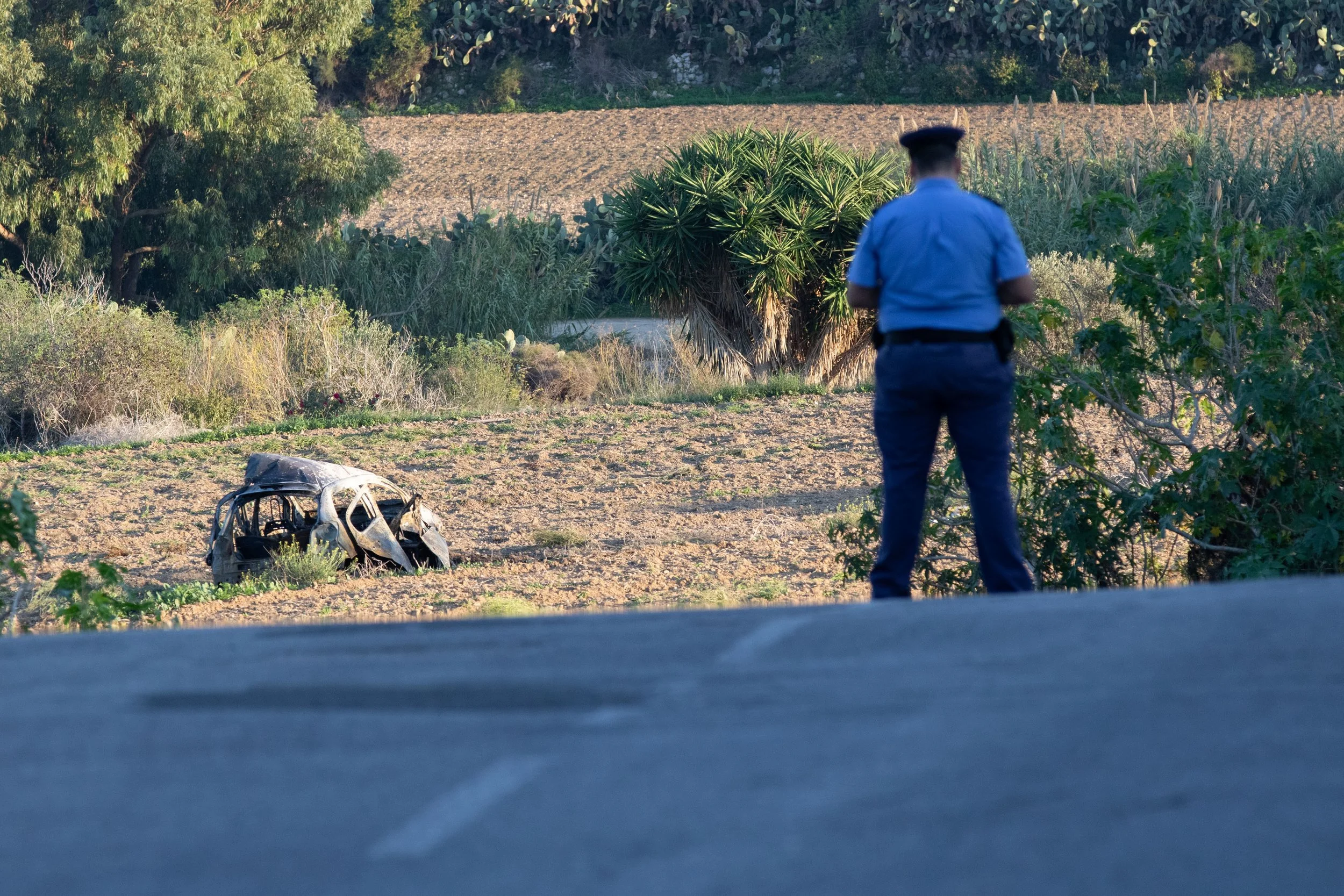
by Martin Agius
The Car Bombed
On October 16, 2017, a car bomb outside the home of Maltese investigative journalist and blogger Daphne Caruana Galizia in Bidnija, Malta, killed her. She covered political scandals and corruption in Malta, and her death stunned both the nation and the world.
As a result of Caruana Galizia's research, Malta's political elite, including the country's then-Prime Minister Joseph Muscat and his close circle, were involved in a number of high-level corruption scandals. She also focused on the financial services sector in Malta, which has a large economic impact on the nation.
Widespread indignation and demands for justice in Malta and other countries followed her death. In Malta, a public inquiry was started to look into the events leading up to her murder. Three men were detained and accused of killing her in 2019, but the trial has been plagued by delays and controversy.
Critics of the Maltese government and court system have charged that they were hesitant to address the systemic corruption and abuse of power that Caruana Galizia's reporting had shown, as well as the failure to adequately investigate and prosecute those guilty for the murder.
In Malta, there have been numerous protests both in the years since Daphne Caruana Galizia's murder and in response to the controversies surrounding her case. Following Caruana Galizia's murder, there has been a movement in Malta for greater accountability and transparency, and there has been pressure on the government to act to address the systemic corruption that plagues the nation.
To look into the events leading up to Caruana Galizia's murder and the efficiency of the police investigation into her death, a public inquiry that is independent of the government was started in Malta in 2019. The investigation's conclusions, which were released in July 2021, were extremely scathing of how the Maltese authorities handled the situation.
A wealthy businessman named Yorgen Fenech was detained in November 2019 in connection with the slaying of Daphne Caruana Galizia. He was also a former director of the Maltese energy firm Electrogas. Fenech was stopped as he tried to board his yacht and leave Malta; he was then accused of participating in the murder.
As of May 2023, Fenech's trial is still continuing on despite his denial of any participation in the crime. Prosecutors claimed during the trial that Fenech collaborated with the three individuals who are charged with committing the murder and gave them money and other benefits in exchange for their assistance.
Many people in Malta and beyond have paid close attention to the case against Fenech because they believe it could lead to a breakthrough in the homicide investigation of Caruana Galizia. Given his connections to some of the highest levels of Maltese politics and business, Fenech's arrest and subsequent charges were seen as a significant development in the case.
It should be noted that Fenech's trial is still ongoing, and he has not yet been found guilty of any crimes connected to the murder. Daphne Caruana Galizia's murder is still a hotly debated topic in Malta, and her legacy as a daring investigative journalist and anti-corruption advocate continues to serve as an example to people all over the world.
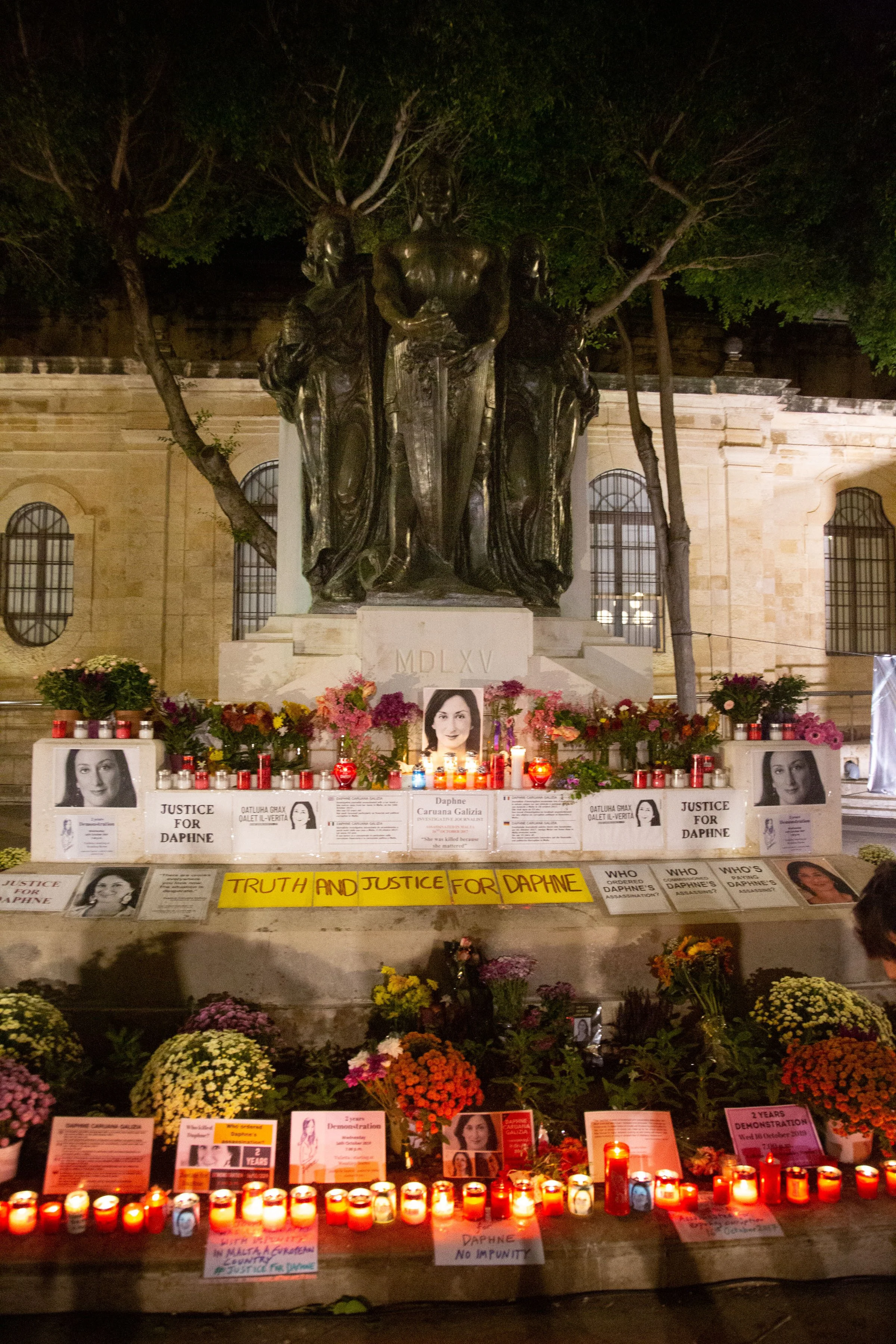
16 October 2019 - Flowers and Candles Placed On Great Siege Monument
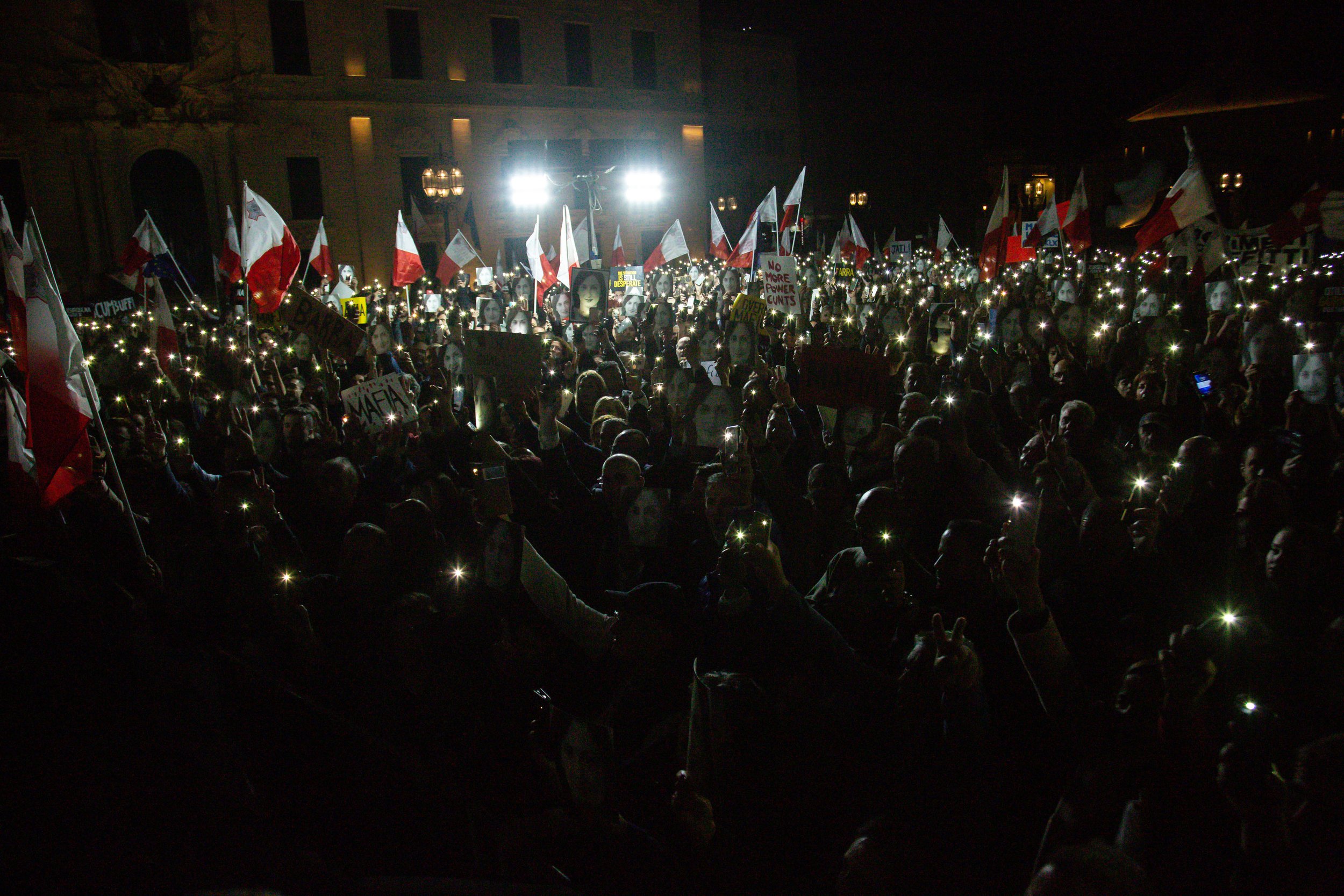
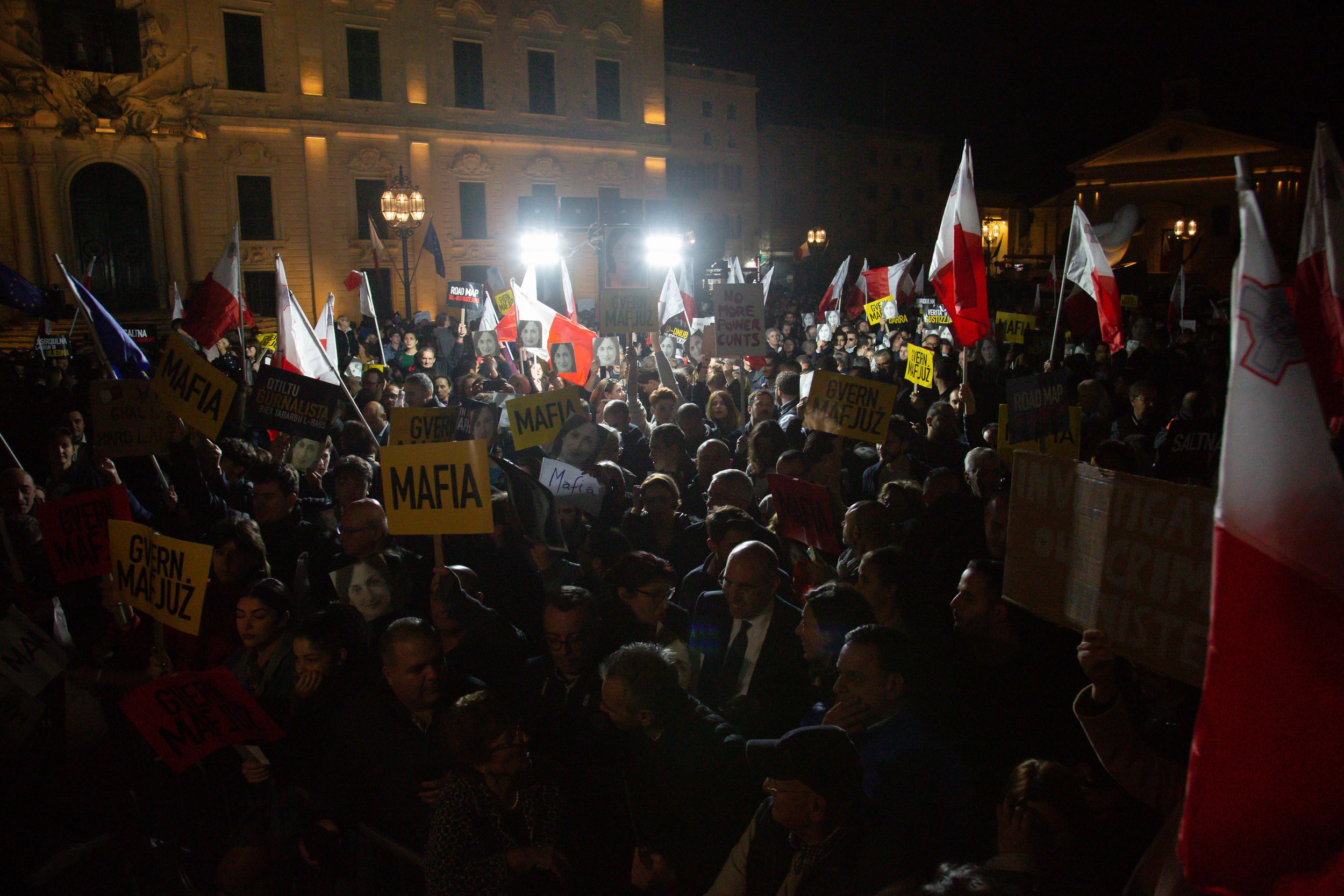
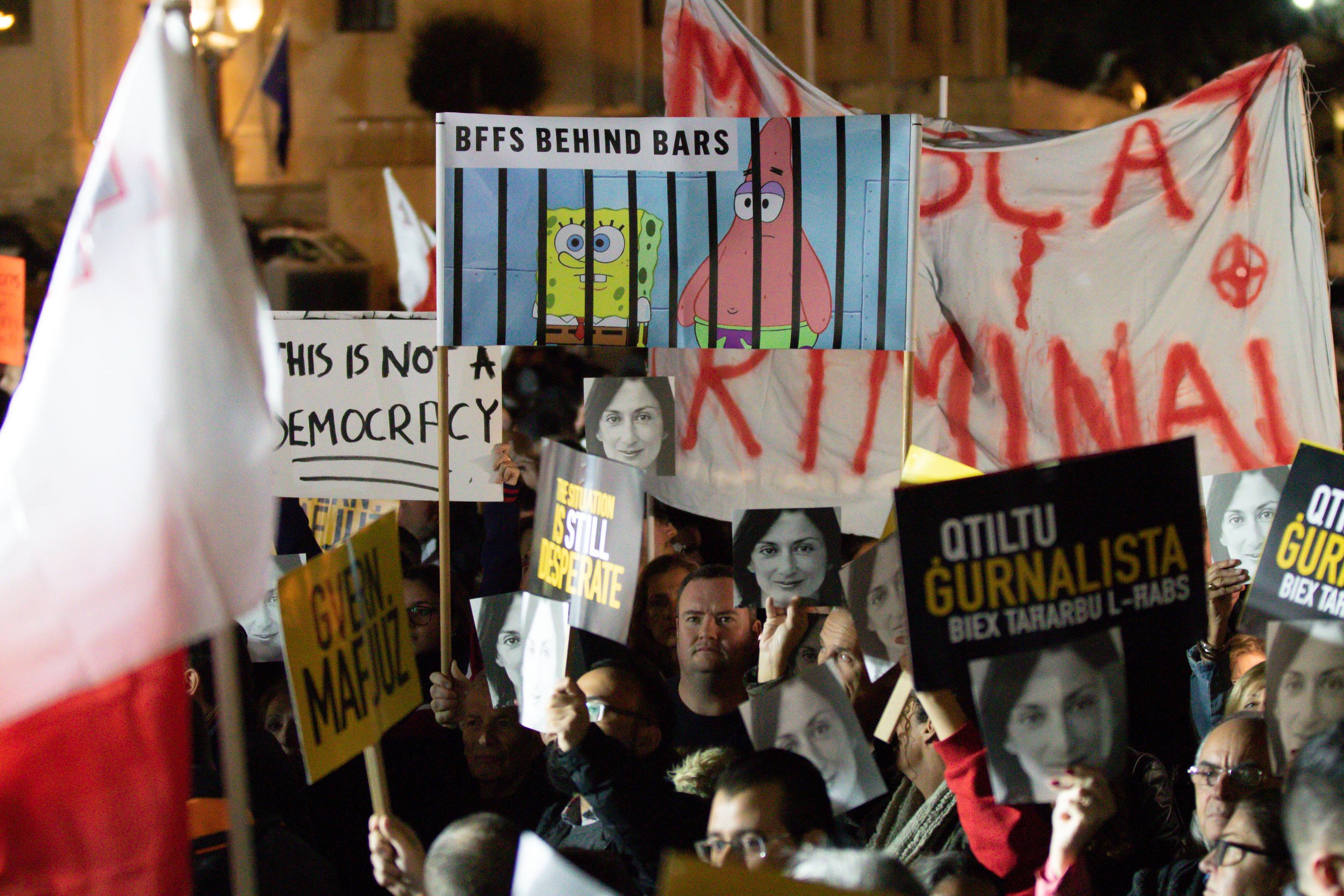
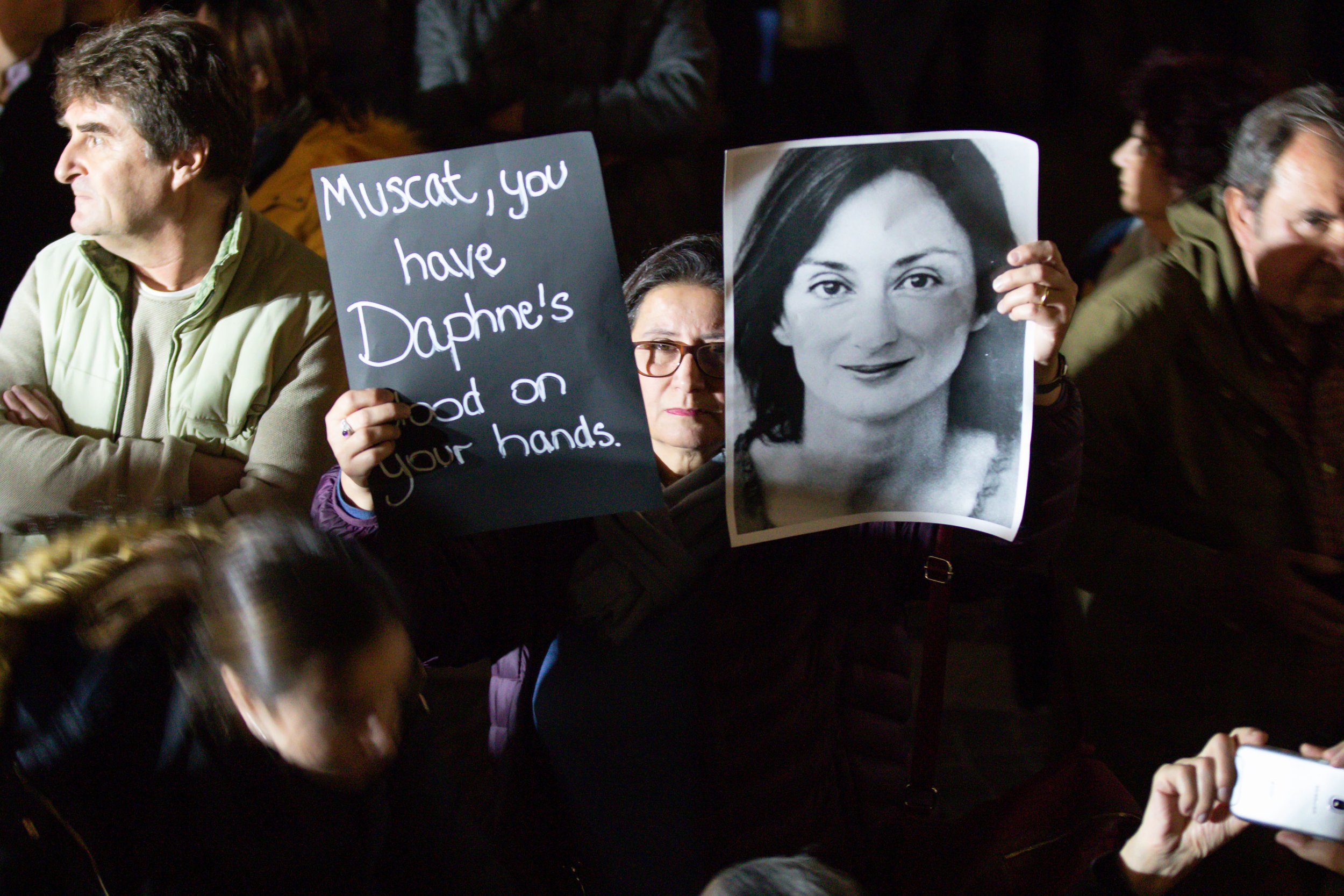
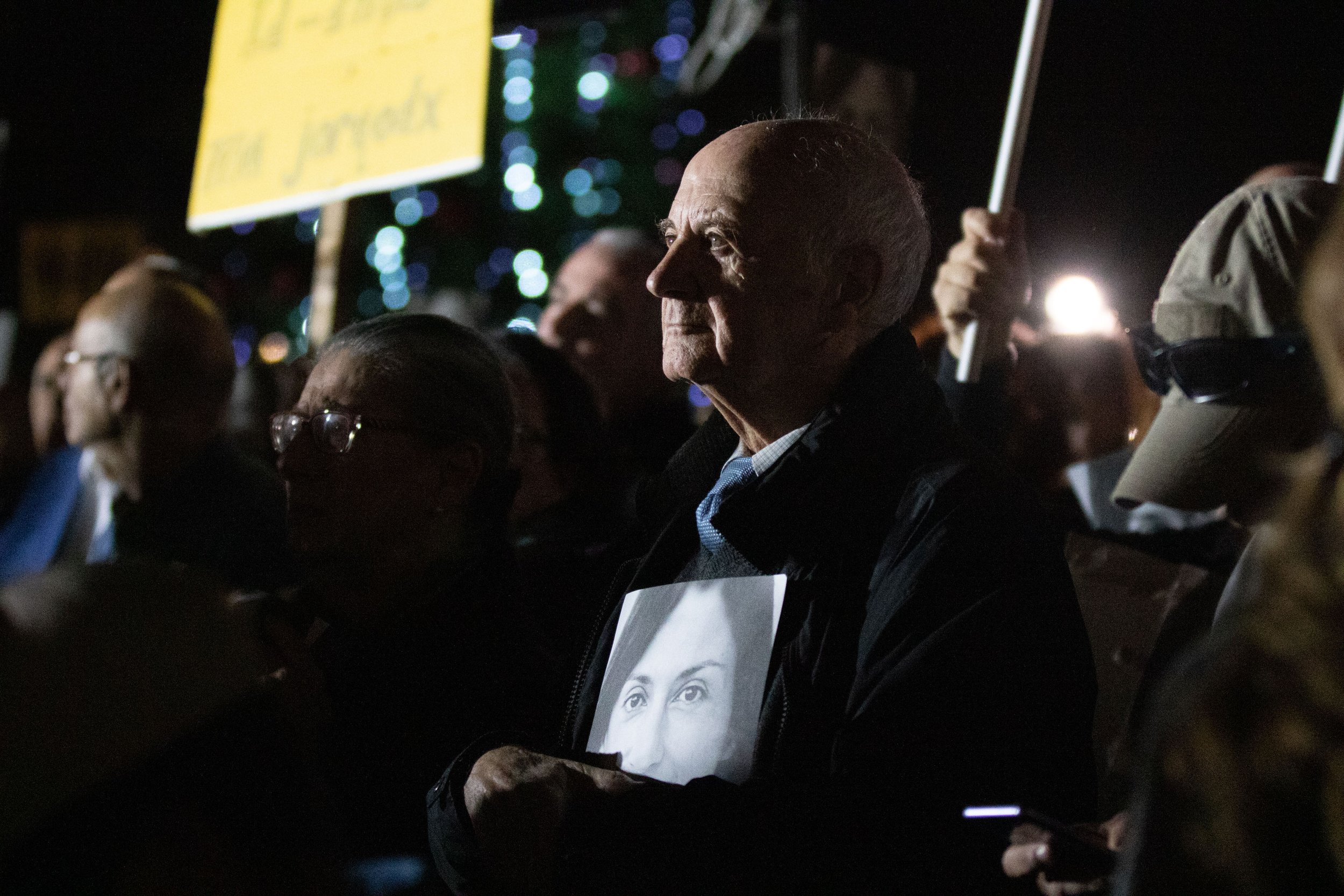
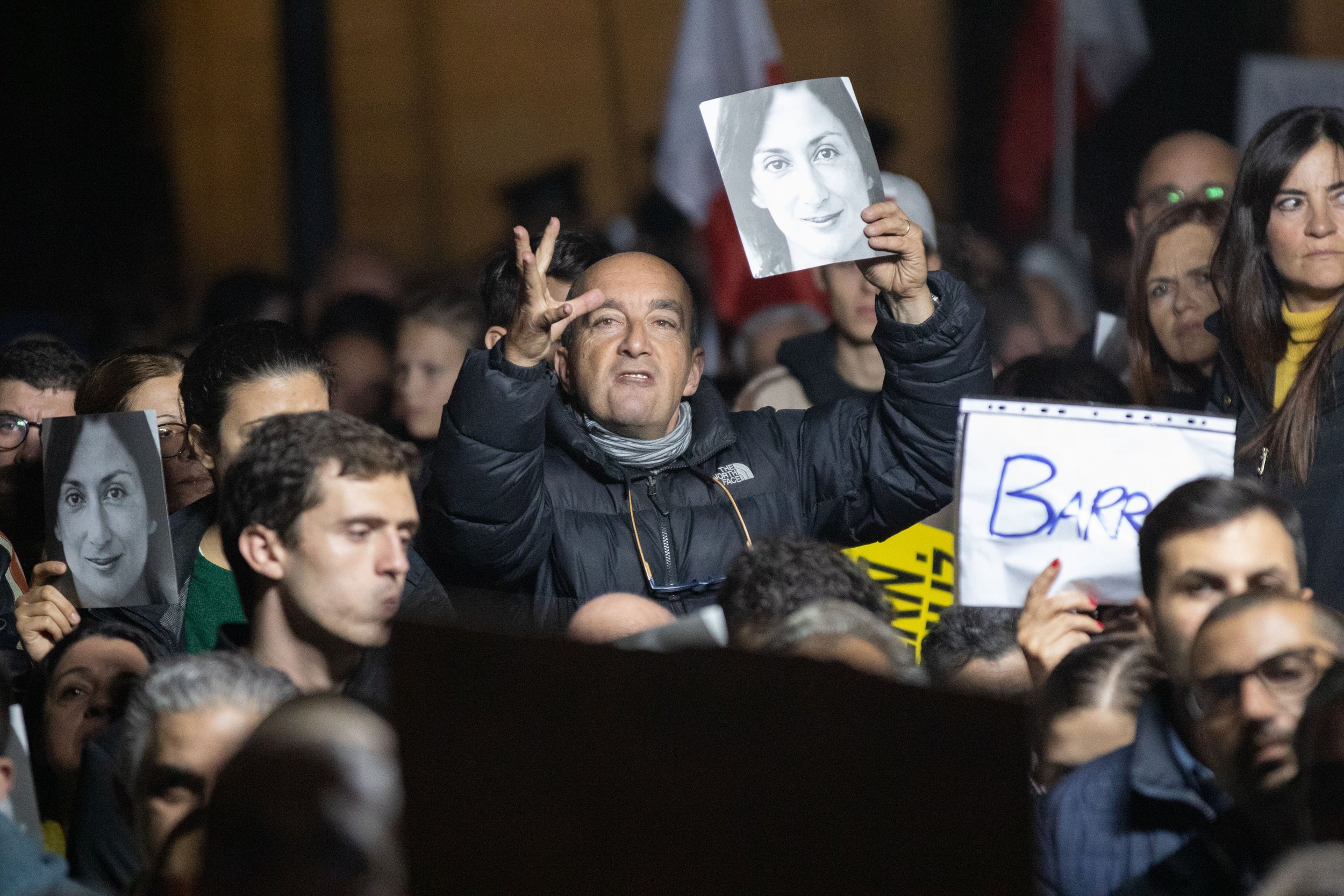
29 Nov 19 - Protestors Gather in Front of Castille the Prime Minister's Officer - Her mother and father with her portrait
1 December 2019 - Protesters Gather in Valletta Demanding DCG Justice
9 December 2019 - Graffiti Movement Activistis in the Doorway of Castille Prime Minsiter's Office

9 December 2019 - Graffiti Movement Activistis Protesting in the Rain near one of the Entrances of Castille Prime Minsiter's Office


by Cameron Scott
Celebrating May Day is an ancient tradition that goes back centuries, marking the beginning of Summer, and also signifying rebirth and new beginnings. Since 1889 it has also been the date for International Workers’ Day and is therefore celebrated by trade unions and other workers’ movements in major cities worldwide. Glasgow’s Trade Unions Council, established in 1858, has long held an annual May Day procession through the city. This year’s event started in the city centre at George Square, then followed a route south, through the Gorbals to Queen’s Park where a rally took place. This year members of the Public and Commercial Services Union, or PCS, which represents civil servants who are currently in dispute with the UK government over wage claims, had the honour of leading the parade. Other marchers following behind represented various unions, political parties and community groups, including the Educational Institute of Scotland, Unison, Living Rent Glasgow and Wyndford Residents Union, both of whom campaign for fair conditions for housing tenants, the Young Communist League and Glasgow universities students groups, in total numbering around one thousand marchers.

